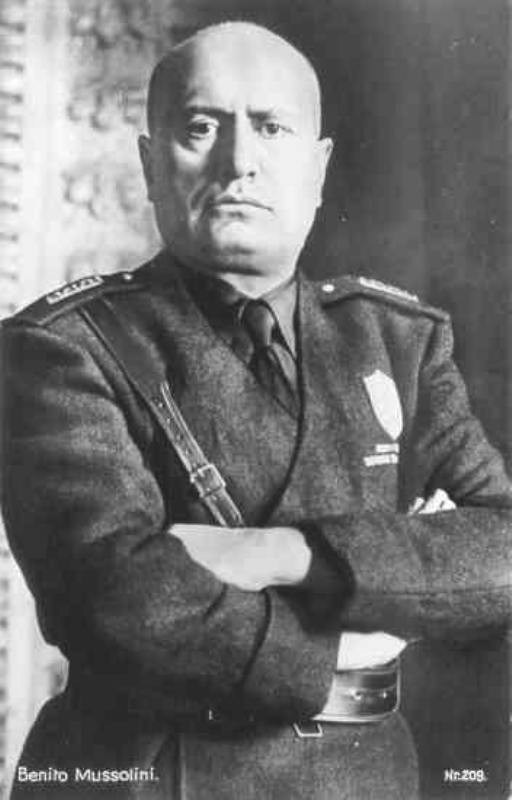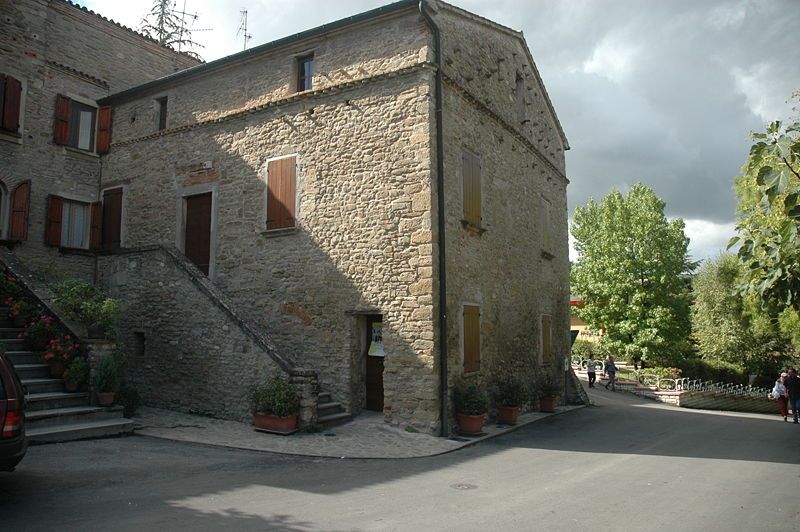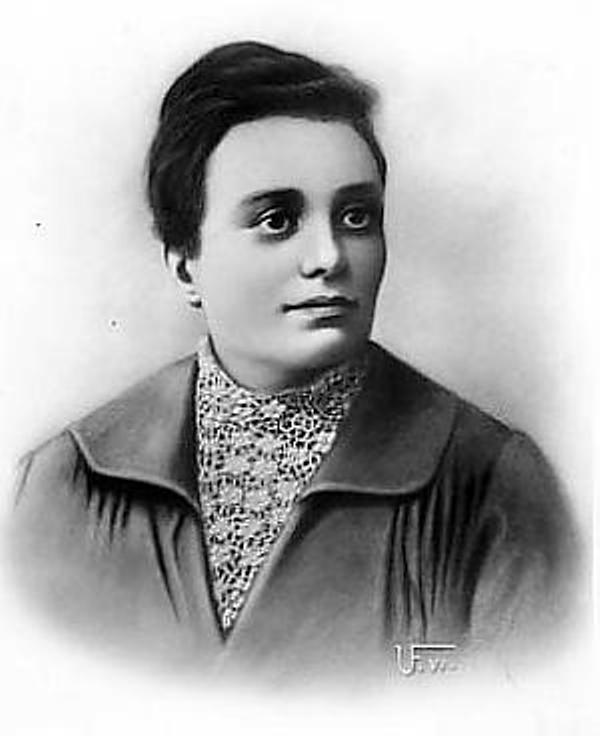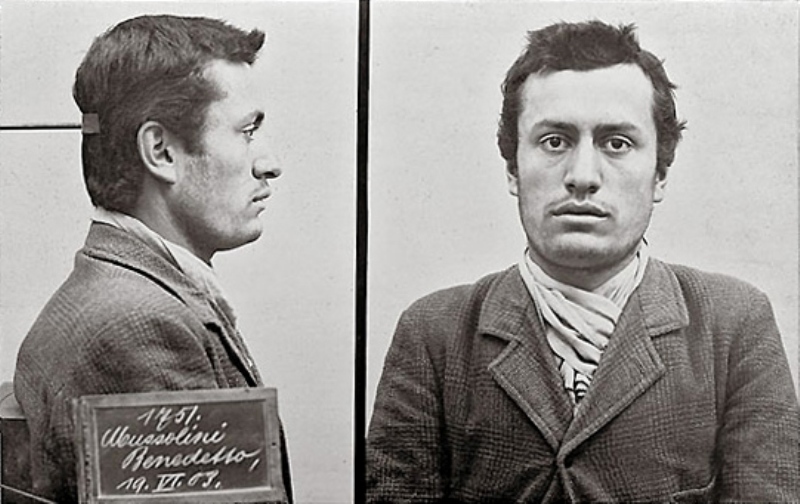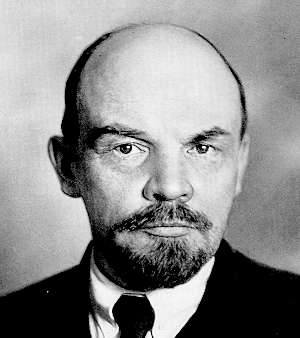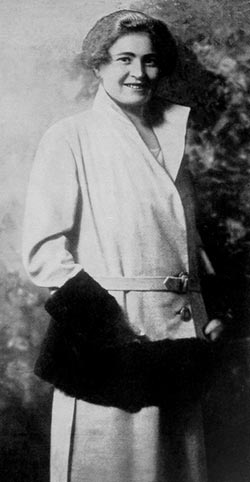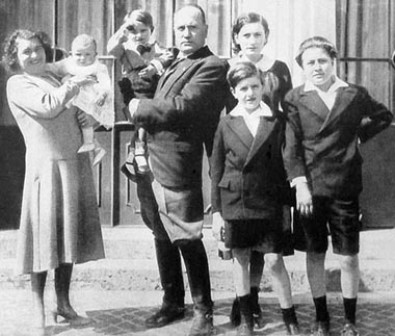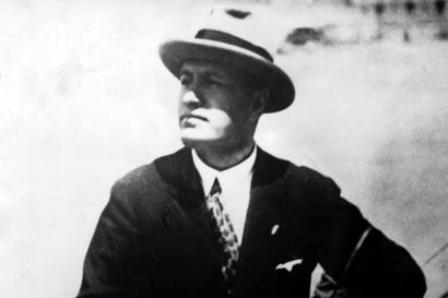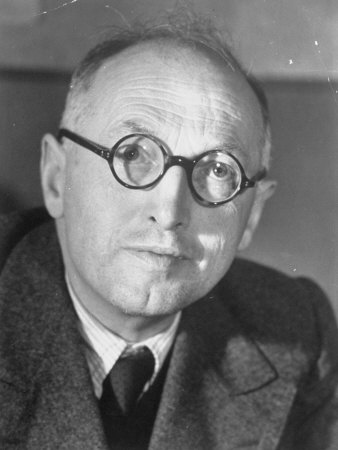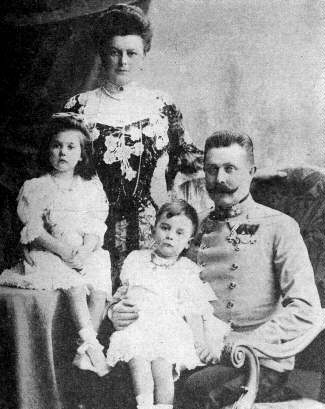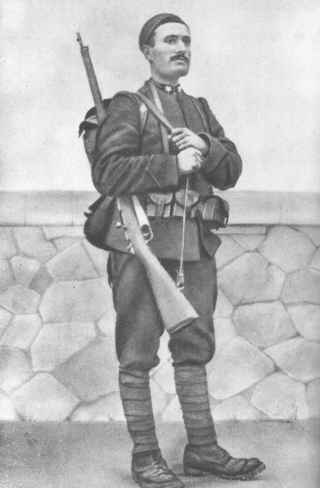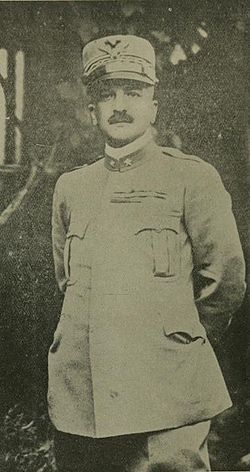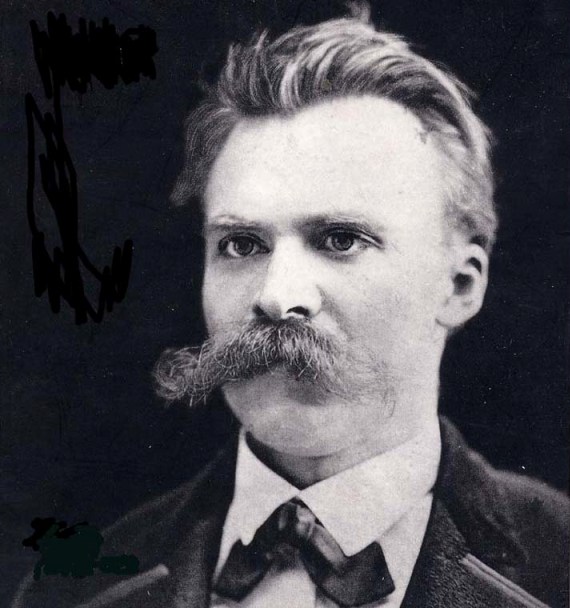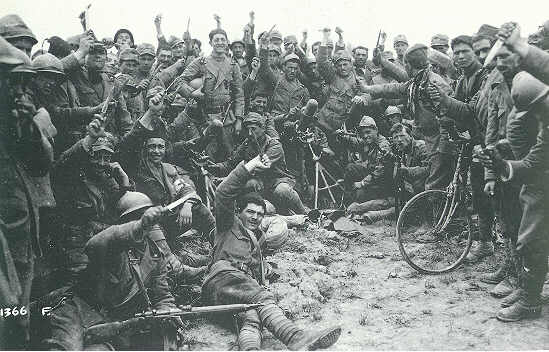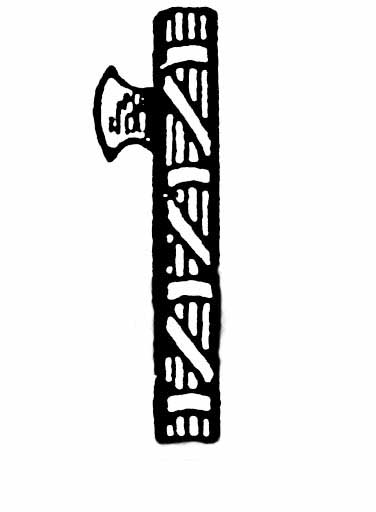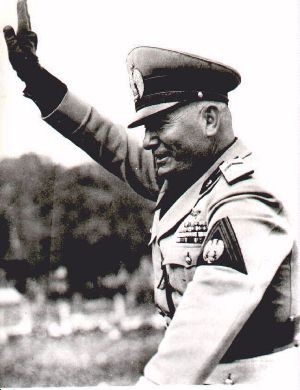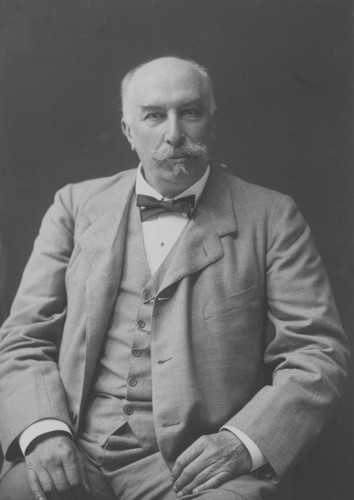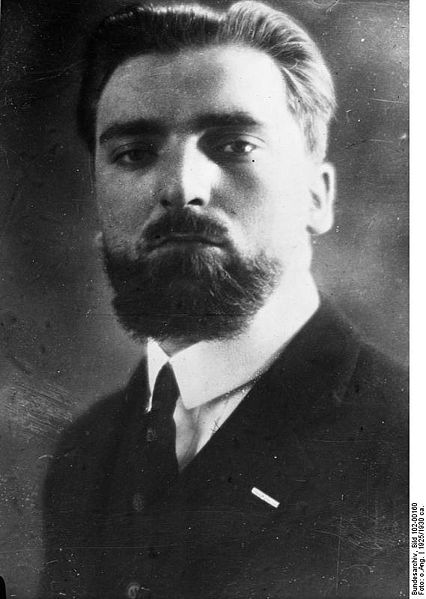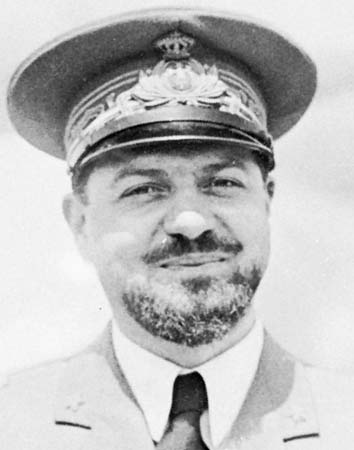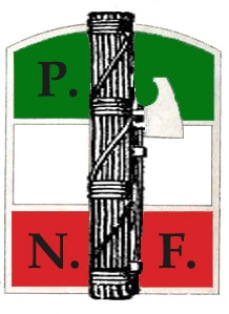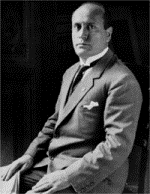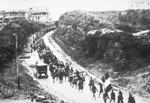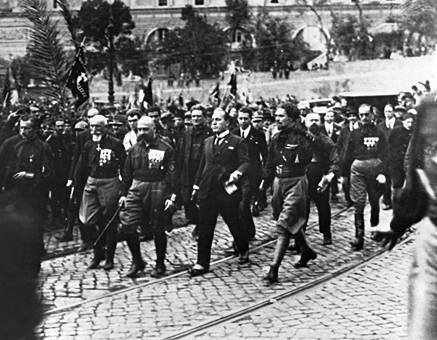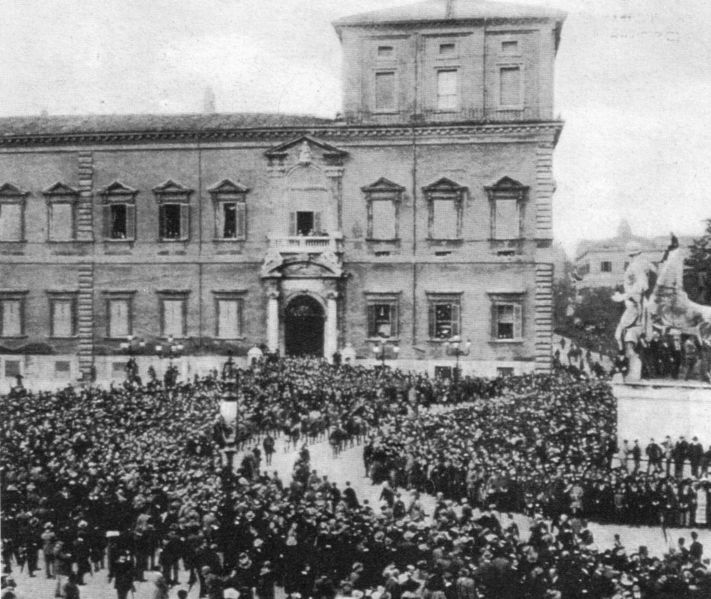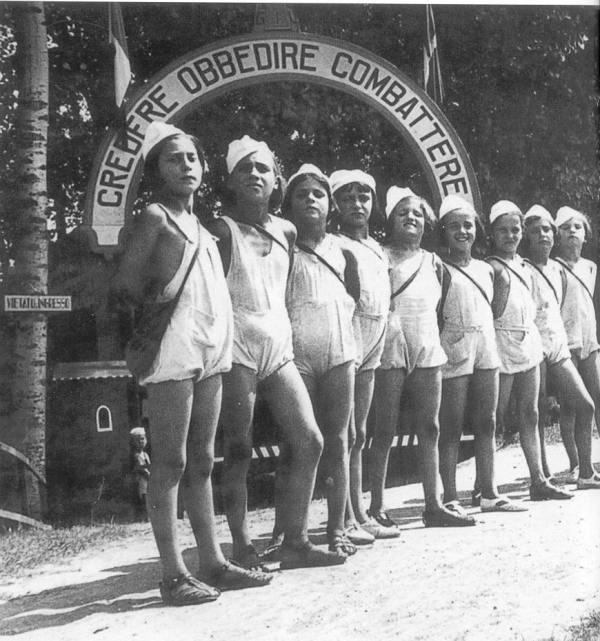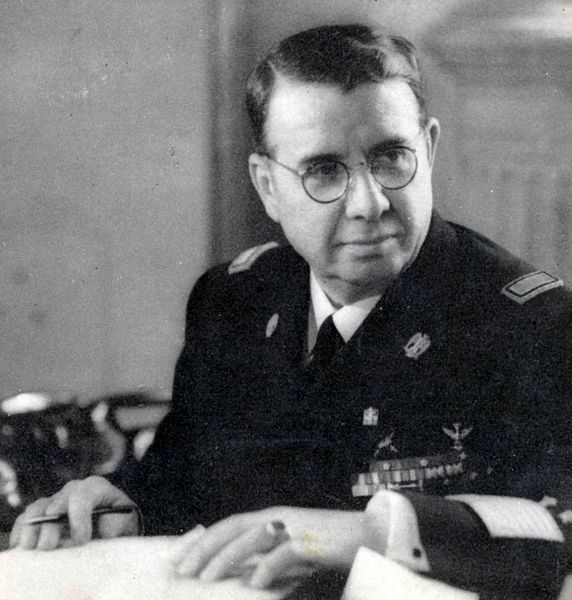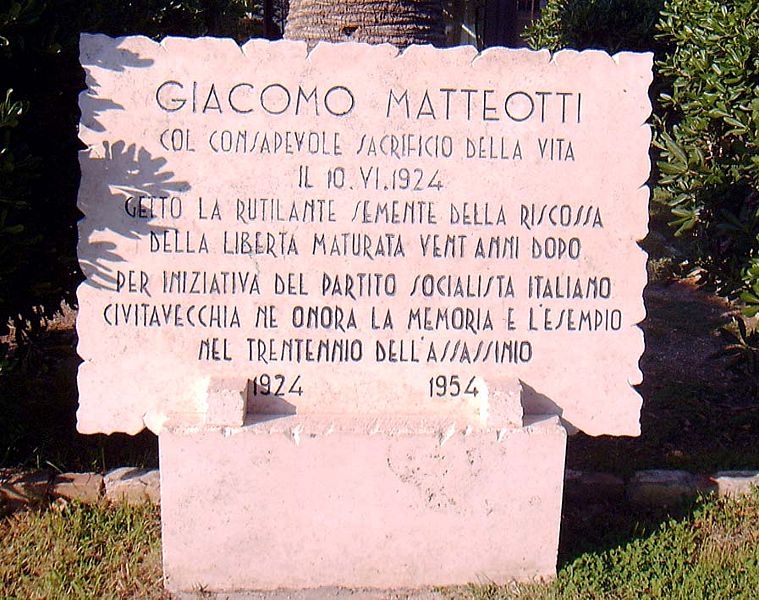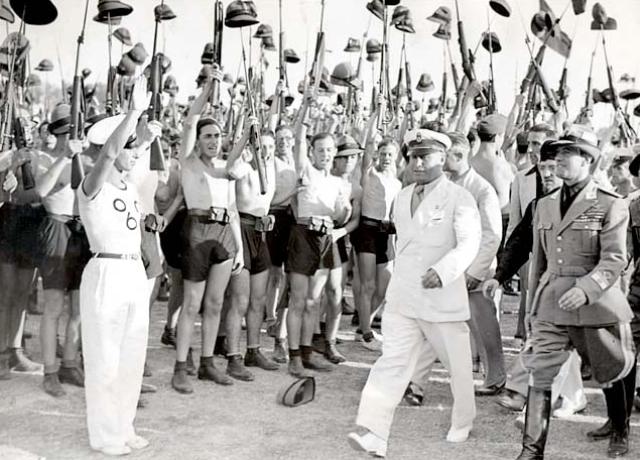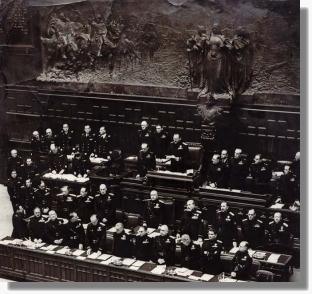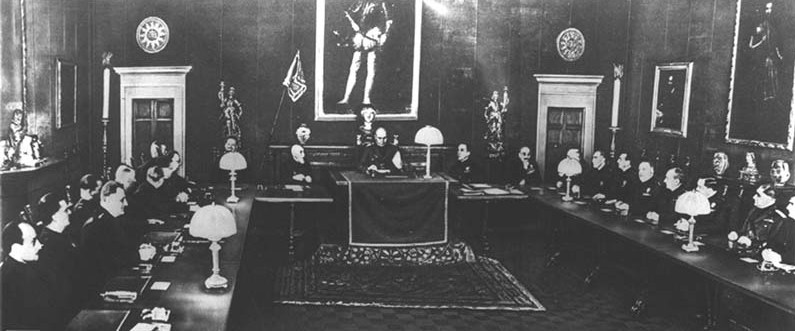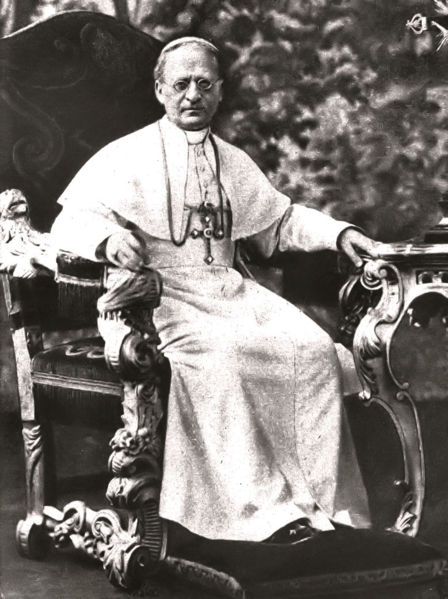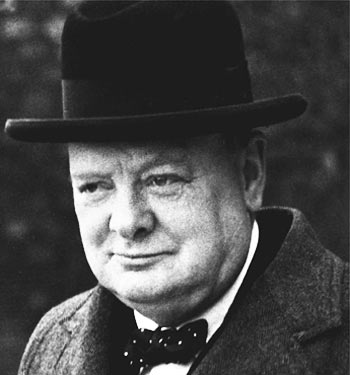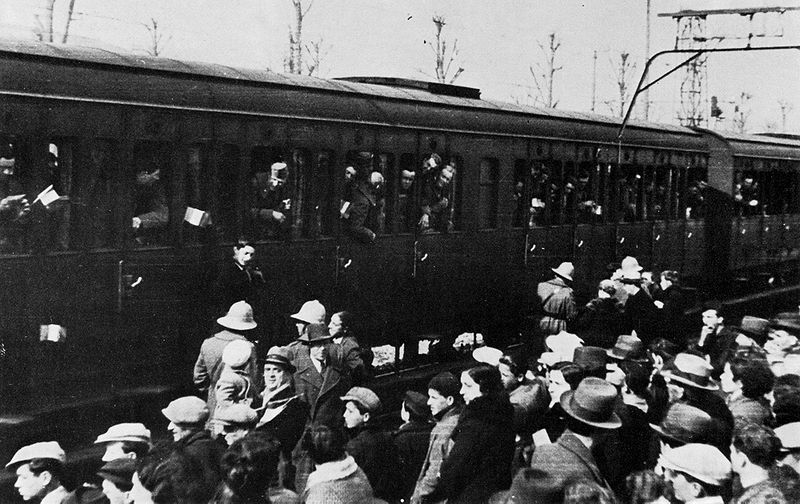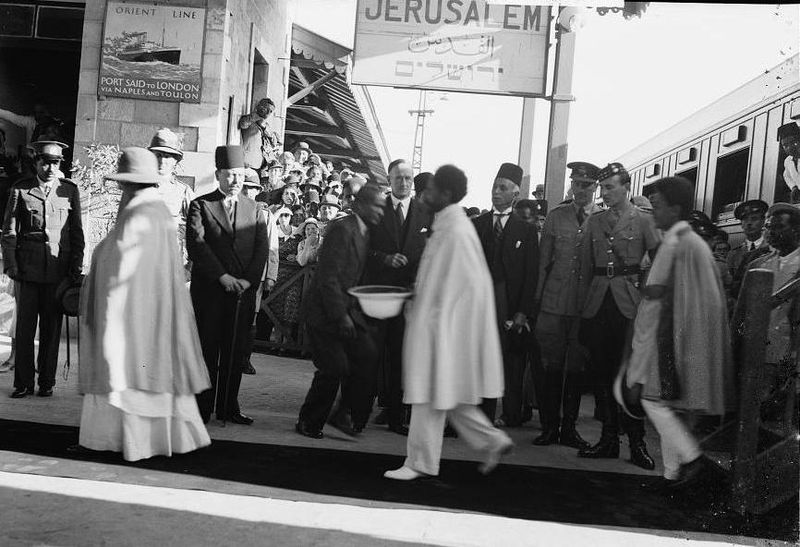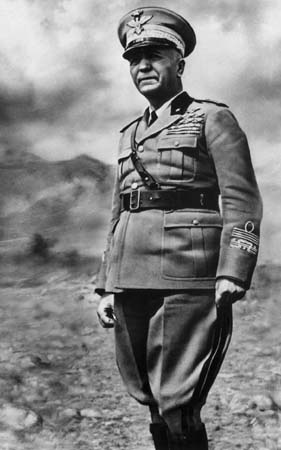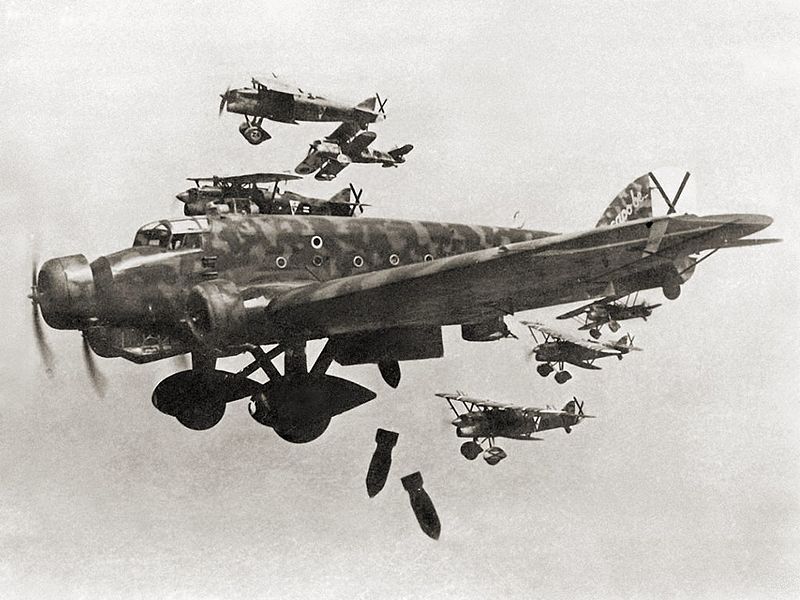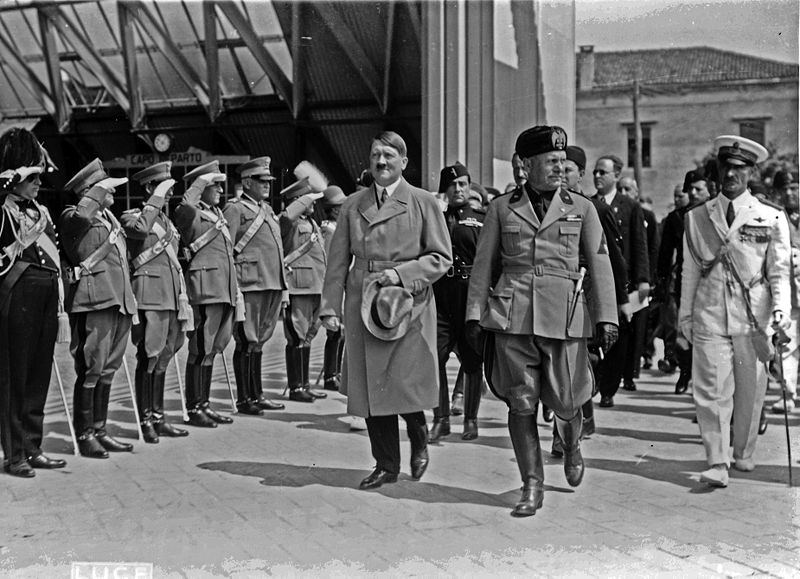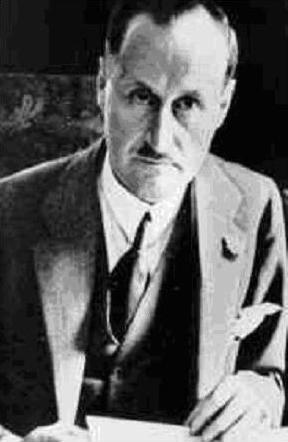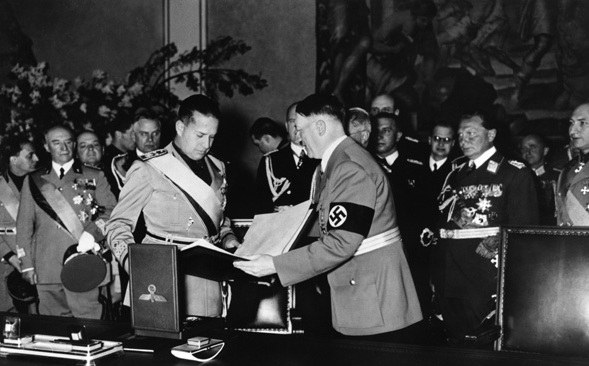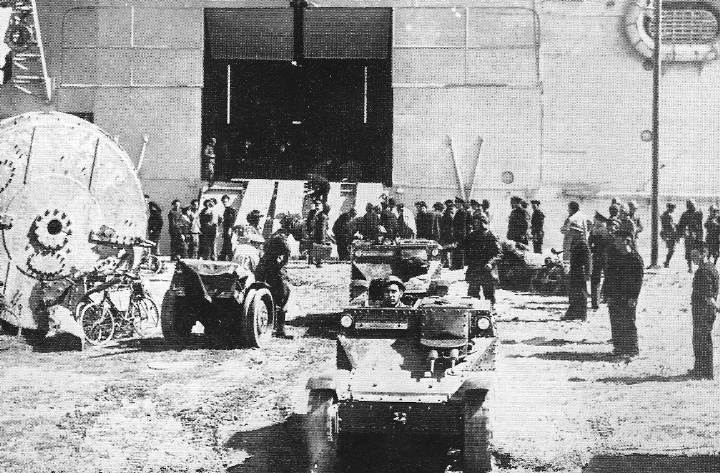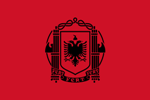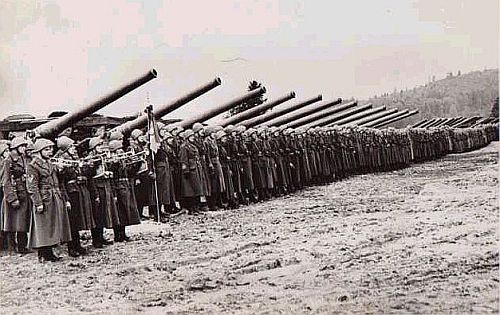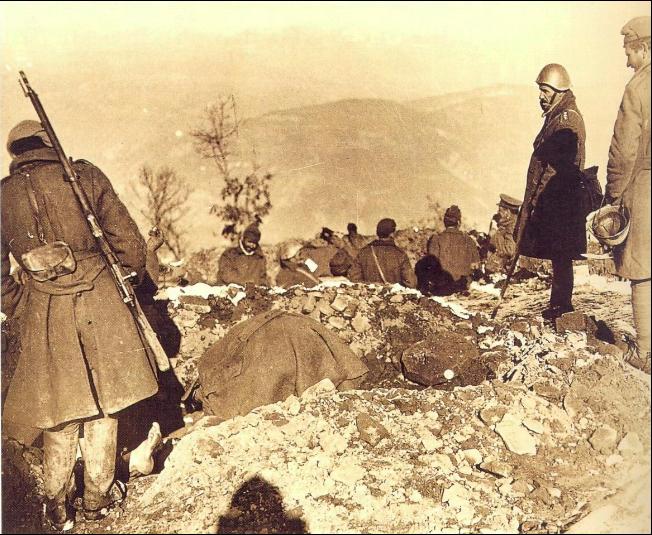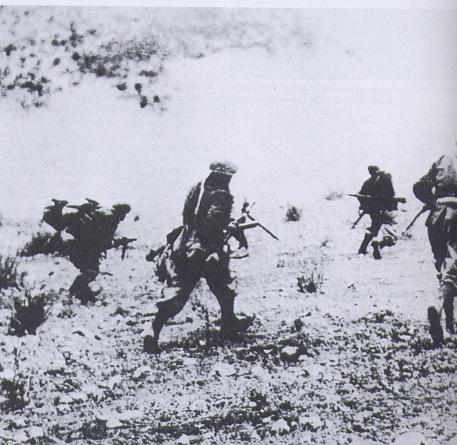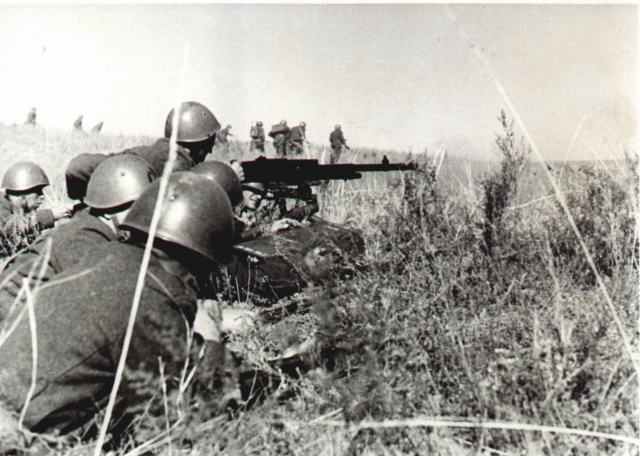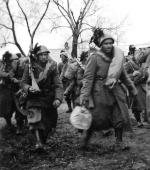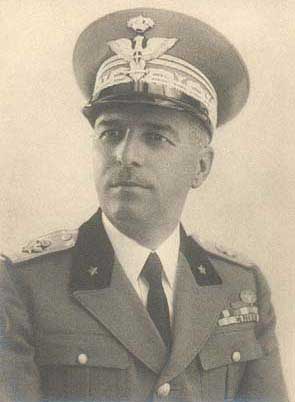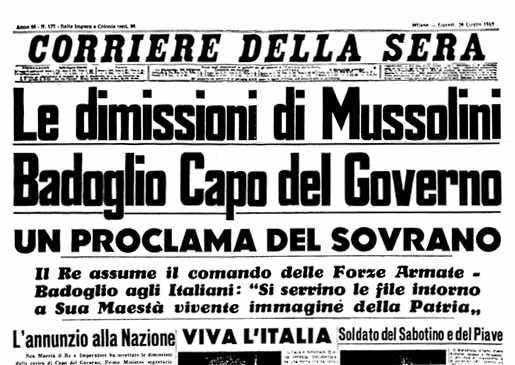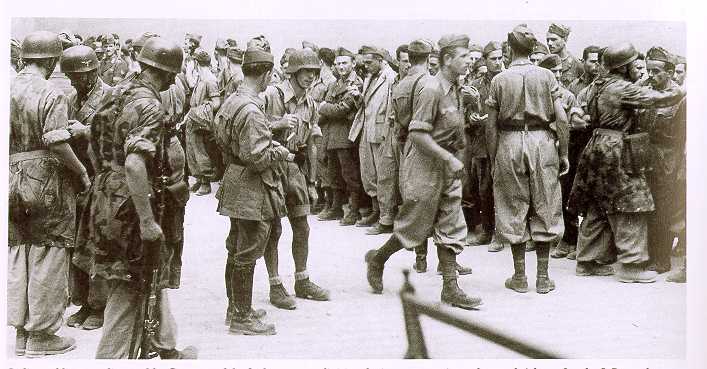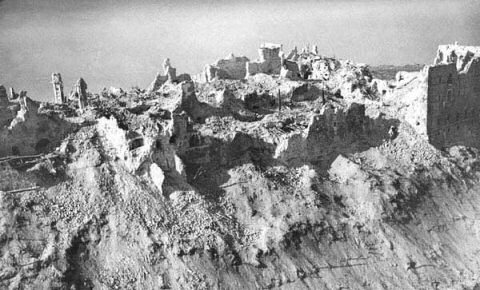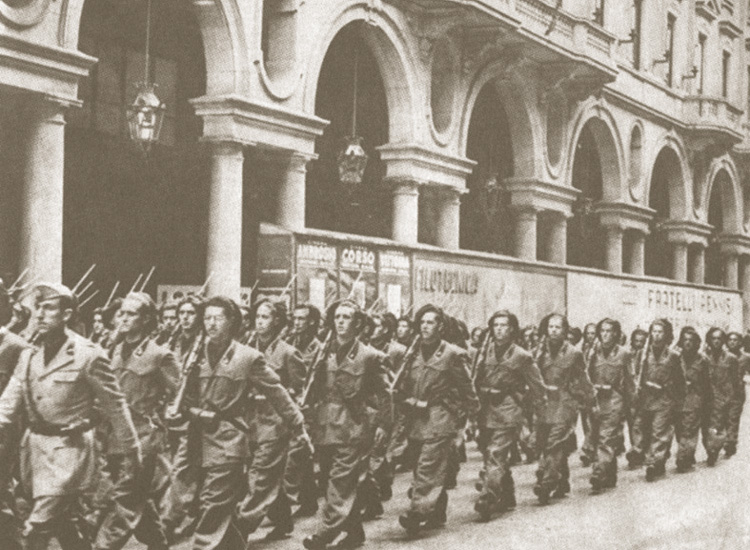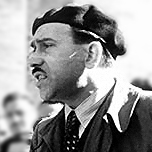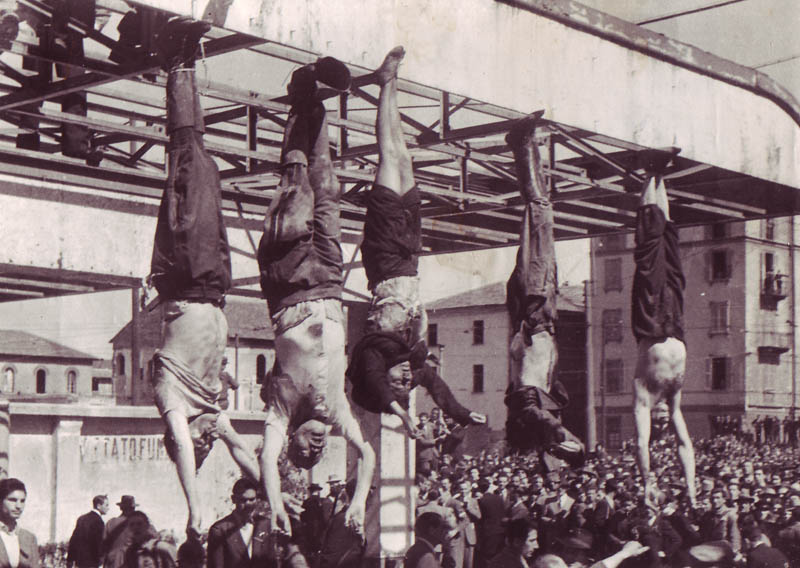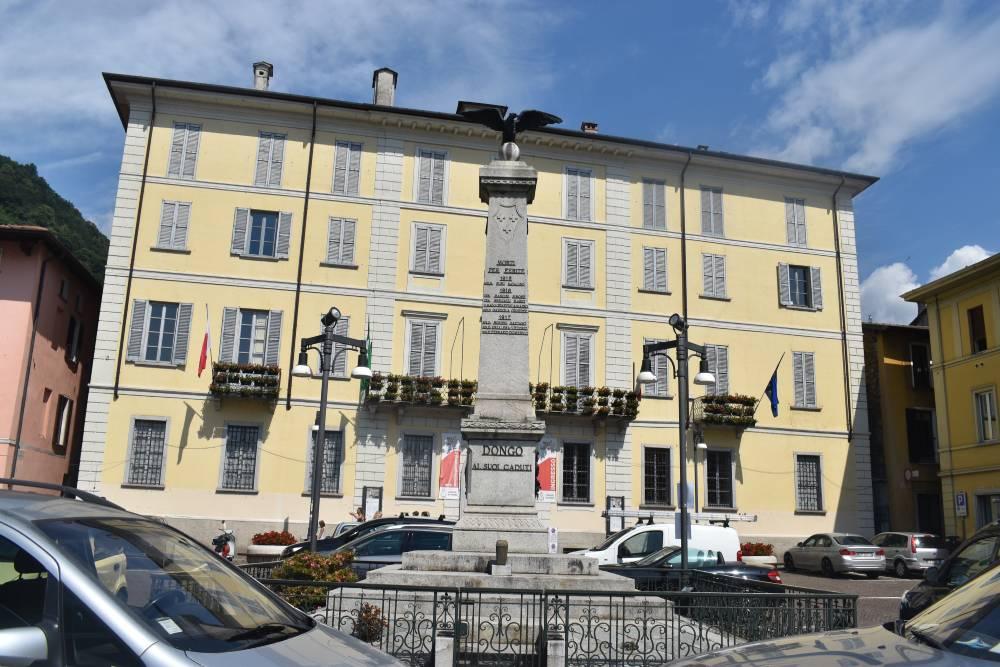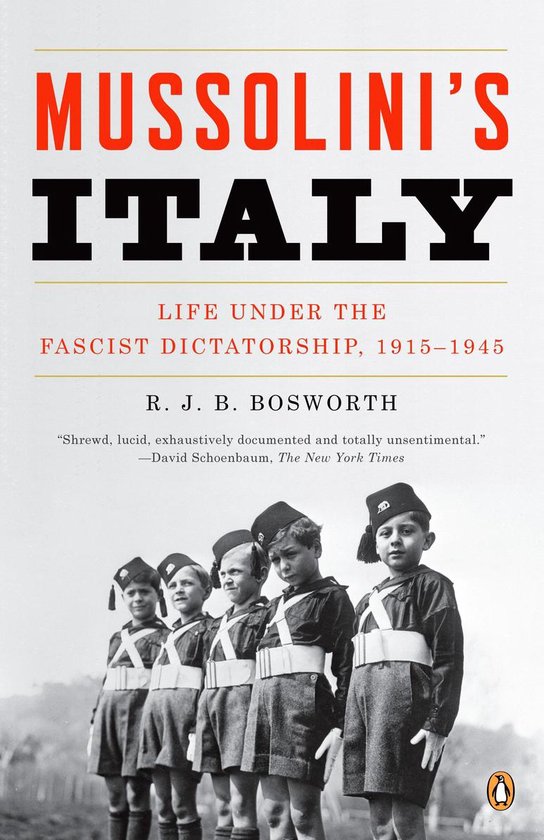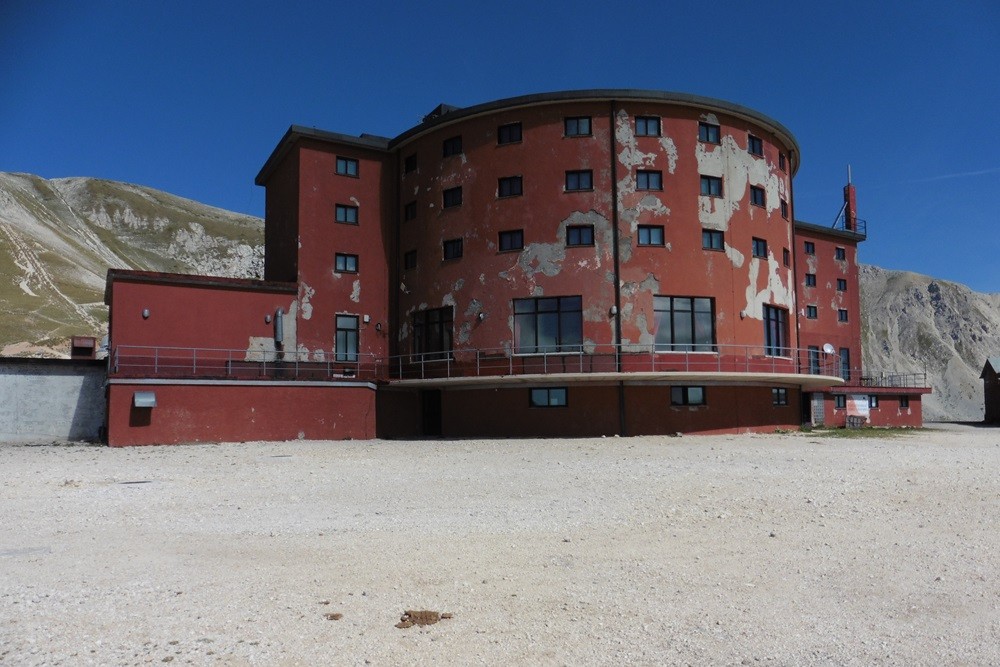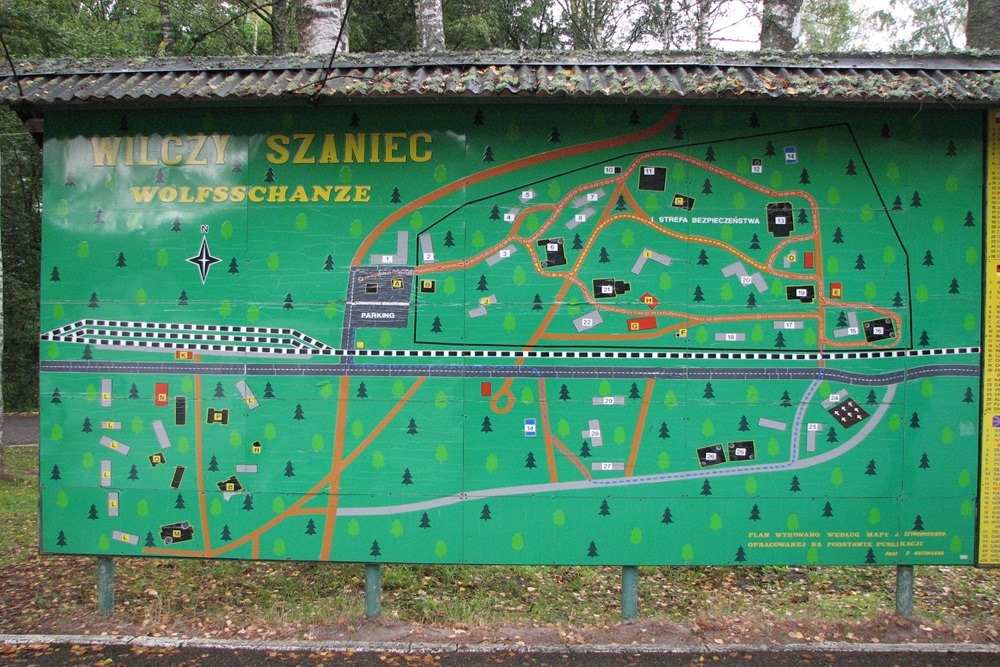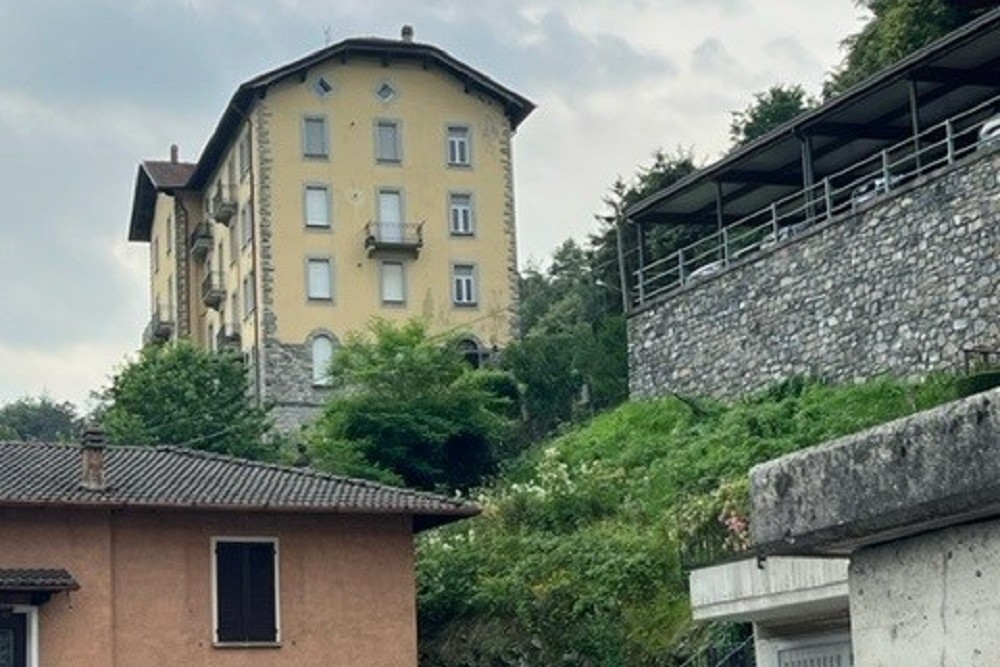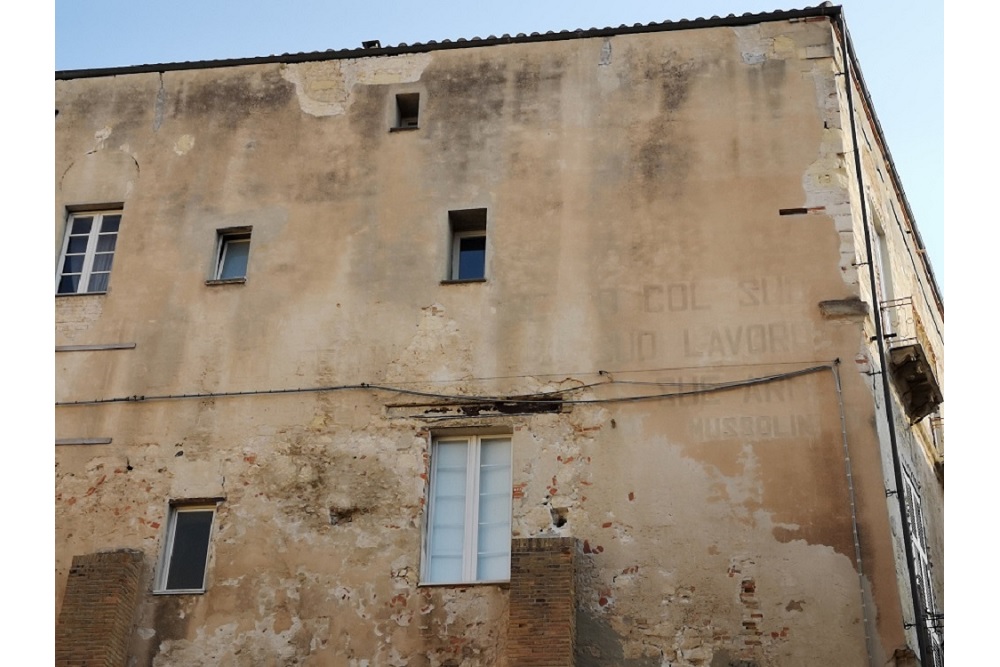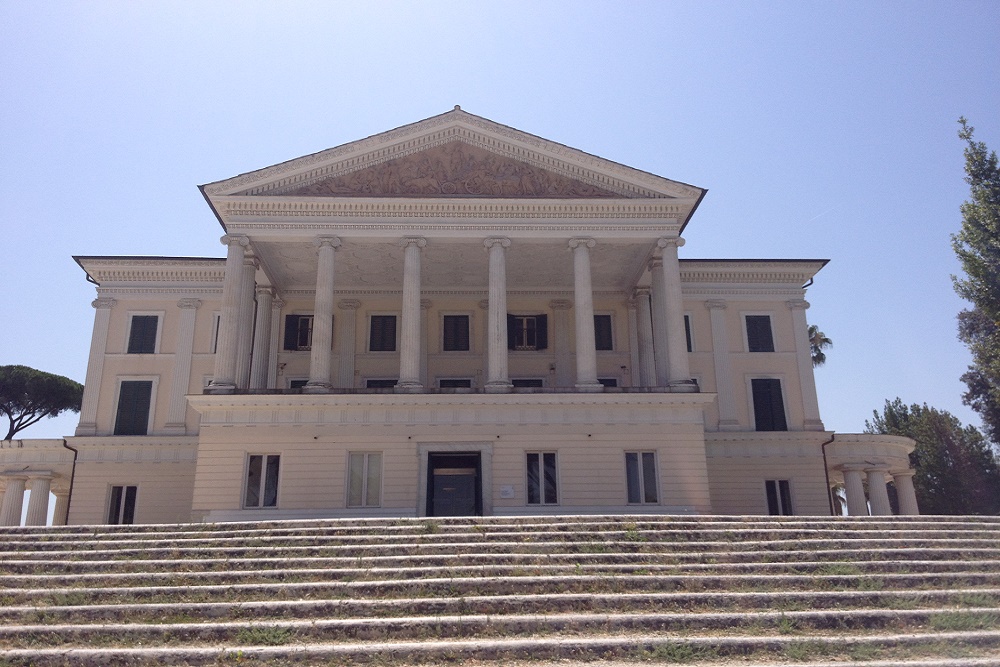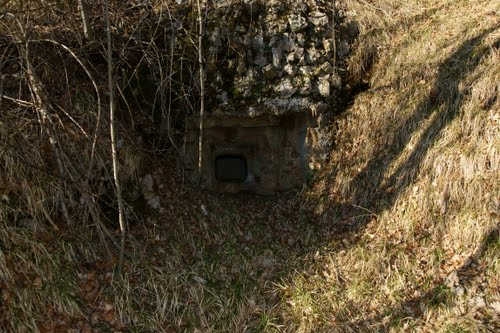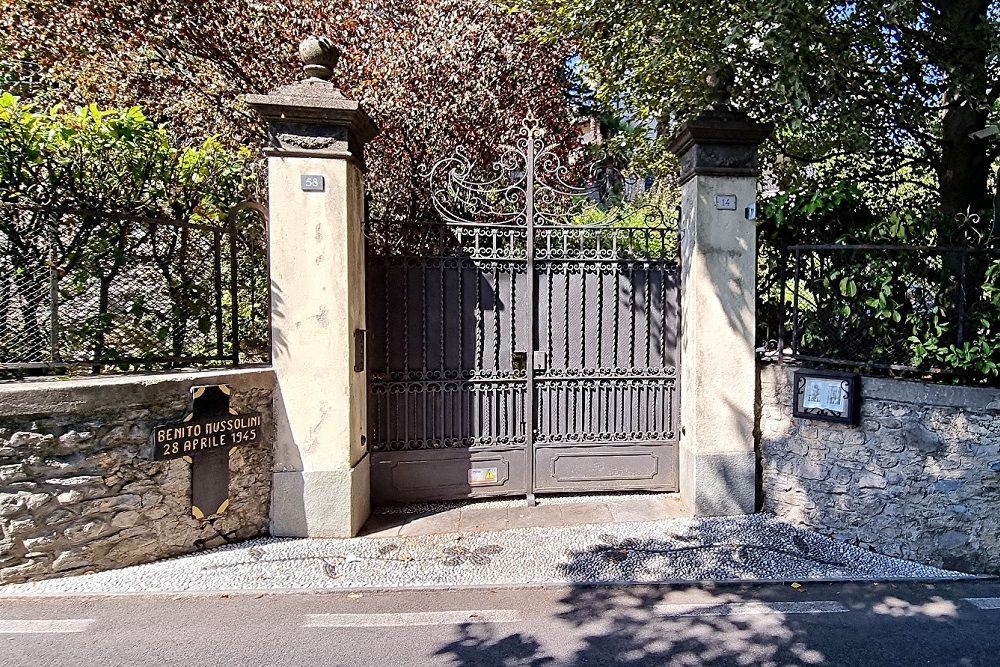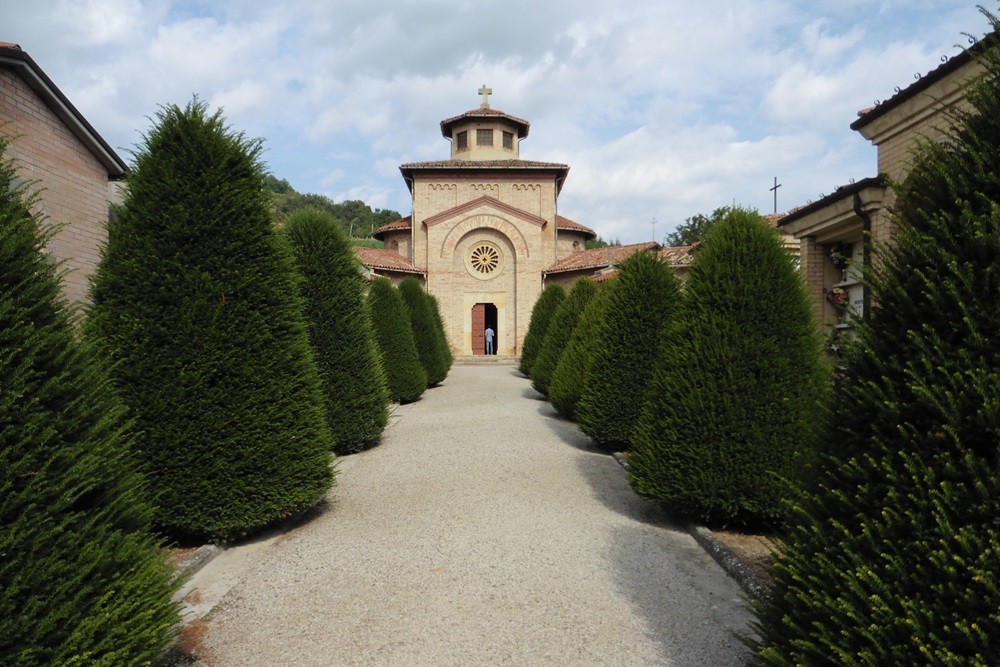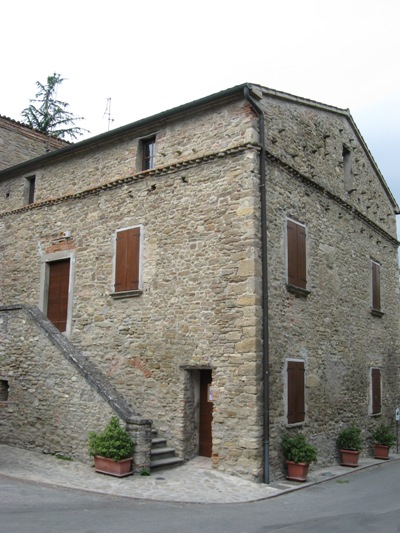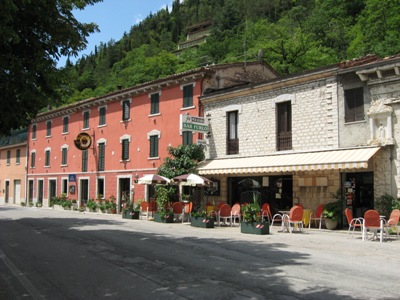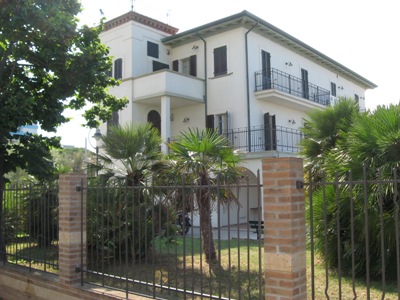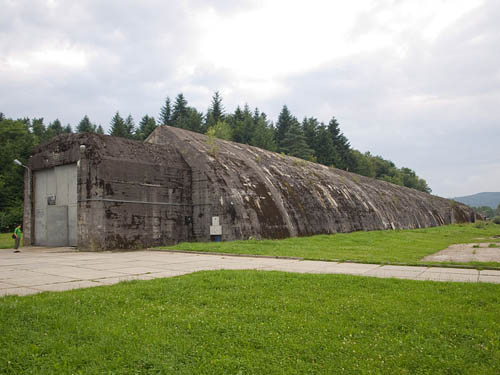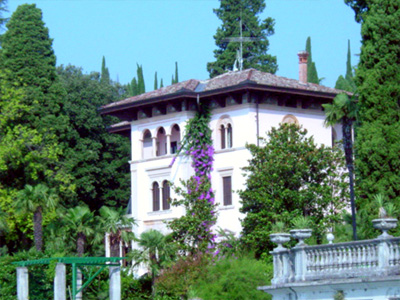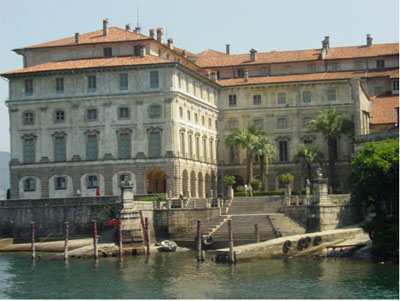Introduction
Benito Mussolini has dominated Italy for years; hence his influence can hardly be underestimated. Following the First World War he and his Fascist party took the reins and ruled the country for more than 20 years. Mussolini transformed Italy into a dictatorship with totalitarian characteristics. In this way he attempted to let Italy play a prominent role in Europe and the world.
Great Britain and France were not keen on this however. Germany, where Hitler had seized power, did consider Italy a welcome ally though. Mussolini was not happy with this course of things at first but in the end, he considered an alliance with Germany the best way to achieve his ambitions. That however would lead to his downfall.
Definitielijst
- dictatorship
- A form of government where the power in a country is in the hands of one person, the dictator. Originally a Roman regime in case of an emergency where total power would rest with one person during six months in order to face a crisis.
- First World War
- Took place from 1914 till 1918 and is also named The Great War. The conflict started because of increased nationalism, militarism and neo-colonialism in Europe. Two alliances battled one another during the 4-year war, which after a dynamic start, resulted into static trench warfare. The belligerents were the Triple Alliance (consisting of Great-Britain, France, and Russia; later enlarged by Italy and the USA, amongst others) on the one hand and the Central Powers (consisting of Germany, Austria-Hungary, Bulgaria and the Ottoman empire) on the other hand. The war was characterized by the huge number of casualties and the use of many new weapons (flamethrowers, aircraft, poison gas, tanks). The war ended in 1918 when Germany and its allies surrendered unconditionally.
Images
His childhood
Benito Amilcare Andrea Mussolini was born July 29th , 1883, in Dovia near Predappio, a small village in the Italian province of Forlì-Cesena (Northeastern Italy). His father was Alessandro Mussolini, the local blacksmith and convinced atheist. His mother Rosa Maltoni on the other hand was a devoted Catholic teacher. Benito took his name from Benito Juarez (1806-1872), former Mexican president who had taken on Emperor Maximilian of Austria and even had him executed. Later on, little Benito got another brother Arnaldo (1885) and a sister, Edvige (1888). The family was rather poor. His father occupied himself mainly with political activism. Being a convinced socialist, he wrote articles for the local socialist papers and he was active as member of the town council. As a result of his political activities he frequently found himself in jail.
Just like his father, Benito was a real rebel. As he wrote in his first autobiography: "I was a restless scoundrel with loose hands. I was the leader of a small gang of guttersnipes that rambled through the riverbeds and the fields." He was frequently involved in skirmishes and was expelled from school for misbehavior. At the boarding school in Faenza, L’instituto Salesiano, he had stabbed another student in the hand with a knife. His new school was the Collegio Giosuè Carducci in Forlimpopoli, a secular school where Mussolini felt a lot better. That did not mean he stayed out of trouble though, here he also got involved in fights and he also stabbed another student with a knife. Mussolini was still allowed to attend classes but he was expelled from boarding school. In both schools however, he was well known for his diligence in studying those things that interested him.
At the end of his school career, Mussolini displayed an increasing interest in politics and in particular in the socialism of his father. He wrote in an essay: "A teacher should reckon with the individual psycho-physical condition of the pupil, the environment in which the child usually is and, not to be forgotten, regarding social differences, that the intellectual product of a poor student is not as big as the product of a rich student. Not while there is such a big difference in their mental capabilities but simply while the poor student does not find peace in his home environment but arguments; no bread but the left overs from charity by the bourgeoisie, while the rich student knows no fear or hunger and may on the contrary enjoy all comforts of life."
Mussolini increasingly took part in political discussions with his father and his father’s cronies. At school, he even held political meetings where he spoke. At the end of January, the legendary opera composer, Giuseppe Verdi died. On occasion of his death, the master of the school asked Mussolini to deliver a speech. Instead of delivering a eulogy, Mussolini grabbed the opportunity to deliver a political speech, launching an attack on the ruling class, something which received a joyous reception by the audience, according to the socialist newspaper Avanti!
In that same year, he took his teacher’s certificate. He applied for jobs for months on end but to no avail. He balanced on the brink of a depression. Fortunately he found sufficient diversion in the numerous adventures with the local girls. At the end of December 1901, he could finally go to work as a deputy teacher in Gualtieri Emiliana, a little town on the river Po. He did not stay for long; at the end of the semester he left for Switzerland, hoping to dodge conscription.
Definitielijst
- socialism
- Political ideology aiming at slight or no class differences. Means of production are owned by the state. Evolved as a response to capitalism. Karl Marx tried to substantiate socialism scientific.
Images
Switzerland
Mussolini’s stay in Switzerland was important for the further development of his ideas.
He traveled around and attempted to make a living in various places. At first he did not do too well and on July 24th, 1902 he was arrested in Lausanne for vagrancy. During the remainder of his life, he would be arrested numerous times: all together, he would end up in jail 11 times.
Later on, Mussolini made contact with Italian socialists. He got a job as a journalist with the socialist newspaper for Italian migrants L’avvenire del Lavoratore. It is important to know that there were many Italian migrants in Switzerland at that time. They were predominantly uneducated and very poor. The socialists attempted to rally them and arouse a political consciousness in them.
Journalism soon proved second nature to him. Mussolini became an important link between the socialist organizers and the masses they attempted to rally. He was well educated, spoke the language of the migrants, knew their problems and, above all, was a gifted orator. His articles but in particular his speeches met with great success. Mussolini did not shy away from extreme ideas, for instance concerning the Church and the monarchy and managed to enthrall his audiences with a lot of theatrical gestures. His active role within the socialist party would spell trouble for him more than once. In 1903 as well as in 1904 he landed in prison again: the Swiss government had no stomach for active socialists who were considered rebels.
In Switzerland, Mussolini met people who would have a profound influence on him. He talked to the Russian Communist leaders Lenin and Trotsky - in exile at that time - but the person who impressed him most was Angelica Balabanov, a wealthy Ukrainian revolutionary socialist. In a later biography, he considered her his only political teacher without whom he would have remained an insignificant activist. The well known economist and sociologist Vilfredo Pareto was also import to him. Later on, as Fascist leader, Mussolini would gladly make use of his theory that the world was being dominated by the elite and that democracy was just another form of being ruled by an elite. Just like Lenin, Mussolini believed that the elite should take charge in order to start a revolution. The masses would never revolt on their own initiative.
At the end of 1904, Mussolini returned to Italy in order to fulfill his military duty he had evaded for so long. His stay in Switzerland however cannot be underestimated: he learned various languages - French, German - he met people with new, interesting ideas, he got to know the masses and how to rally them.
Definitielijst
- democracy
- From the Greek: demos (the people) kratein (rules). Democracy is a form of government elected by the majority of the people in which the people can check on the leaders and have the government resign in case a majority of the people no longer agrees with the government.
- revolution
- Usually sudden and violent reversal of existing (political) the political set-up and situations.
Images
A revolutionary socialist
In January 1905, Mussolini joined 3rd Company, 2nd Battalion of the 10th Bersaglieri Regiment in Verona. One month later however he went on leave because of the bad health of his mother. She passed away February 19th, not yet 46 years old. It was a severe blow to 21 year old Benito.
In September 1906 Mussolini terminated his military career. It is highly conspicuous that he wasn’t punished or even reprimanded once during this period. He was a convicted deserter and was known for the political unrest (with his anti-militaristic ideas for instance), he had caused in Switzerland. He was undoubtedly being watched but he apparently never gave cause for any sanction. It looked as if Mussolini had rather enjoyed his service in the army.
Following his discharge, Mussolini resumed teaching, although he did not really like it. In Switzerland however, Mussolini had experienced poverty and he had no desire to go through that again. On October 23rd, 1906, he left for Tolmezzo, northwest of Venice, to teach at a primary school. Hardly a year later he had left again to take his certificate at the University of Bologna as a secondary school teacher of French. Mussolini passed without problems and subsequently could commence at the Collegio Civico Ulisse Calvi, a boarding school in Oneglia, Liguria.
Teaching however was not his main occupation. The integrity and the obedience he had displayed in the military were soon forgotten. He wrote for the socialist weekly La Lima, signing his articles with Vero Eretico (True heathen). Soon he also had various affairs. Paoli Denti, Luigia Paggetta, Giovannina Amoretti are just a few names on his list of conquests.
In 1909, Mussolini became general secretary of the trade union of Trentino, the Camera del Lavoro. He also became editor of the socialist weekly L’avvenire del lavoratore and wrote numerous pamphlets of a strong anti-military and anti-clerical nature. Together with Alto Adige, Trentino formed the province of southern Tirol, a part of the Austro-Hungarian Empire. The discussions that were conducted here about the future of southern Tirol - to remain in the Empire or become a part of Italy - caused Mussolini to think hard about nationalism, a subject which up till then he had little interest in. He was a revolutionary socialist and was doubtful about his attitude in this discussion. Socialism was much more internationally oriented. To call Mussolini a convinced nationalist from the start is actually more than one bridge too far.
He did grow more and more convinced though of his distaste for the Church and democracy. He described the Vatican as: "a den of intolerance and a bunch of thieves." At a meeting, Mussolini declared: "He who says democracy, says a gang of crooks from the political sewers, says lawyers looking for clients, teachers looking for jobs, journalists knocking on the counter for secret funds, speculants buying the silence of judges, restless minds that claim to be anti-clerical but share their beds with the Free Masonry which has become a general union of maffiosi today." The only solution was physical and material violence because "ideas remaining on the shelf are entirely harmless."
In this respect, Mussolini arrived at the same conclusion as Lenin: revolution was impossible via parliament or democracy. In any case, his vehement statements were not appreciated by the Austrian rulers; hence he was arrested, locked up and fined frequently.
At the end of 1909, Mussolini moved to Forli where his father was living with his new girlfriend meanwhile. Mussolini himself had an eye for Rachelle for a long time, the daughter of his father’s girlfriend. On January 17th, 1910, he married her, although without official consent, neither by the Church nor by law. It boiled down to the fact they were going to live together without officially putting it down on paper. Rachelle must have been pregnant already at that moment because some eight months later, on September 1st, she gave birth to their first child, Edda. A few months later, on November 19th, 1910, Alessandro Mussolini, Benito’s father passed away.
Definitielijst
- democracy
- From the Greek: demos (the people) kratein (rules). Democracy is a form of government elected by the majority of the people in which the people can check on the leaders and have the government resign in case a majority of the people no longer agrees with the government.
- nationalism
- The pursuit of a people to become politically independence or securing such independence.
- Regiment
- Part of a division. A division divided into a number of regiments. In the army traditionally the name of the major organised unit of one type of weapon.
- revolution
- Usually sudden and violent reversal of existing (political) the political set-up and situations.
- Socialism
- Political ideology aiming at slight or no class differences. Means of production are owned by the state. Evolved as a response to capitalism. Karl Marx tried to substantiate socialism scientific.
Images
Collision with socialists
Meanwhile, Mussolini increasingly attempted to stamp his mark on the socialist party. He did not really succeed in this. At the party conference in Milan in October 1910, he tried therefore to separate the revolutionary wing and create a new party. That failed also but it did show his ambitions. The moderate party leadership had, in Mussolini’s view, messed things up thoroughly when they refused to support a general strike in protest against the war, after it had been declared between Italy and the Ottoman Empire. Italian interests obviously carried more weight than the traditional pacifist attitude of socialism. Mussolini was furious but he learned from it that nationalism had a stronger grip on the Italian working class than socialism. Nonetheless, he remained a member of the party.
In the Romagna, the region where Mussolini was born, people were more than ready to strike. A few thousand socialists and republicans, led by Mussolini and Pietro Nenni, took to the streets. Both leaders were quickly arrested and imprisoned for a few months. After his release from prison on March 12th, 1912, Mussolini tried again to play a dominant role in the socialist party. Instead of establishing a new party with his revolutionaries, he wanted to put his followers in the most prominent positions. Thereto he submitted a motion of distrust against party leader Leonida Bissolati and his reform minded followers. Congress passed the motion and opted for a new national party leadership with Mussolini. Almost simultaneously, he became editor in chief of the socialist daily Avanti! He was not yet 30 years of age.
Mussolini quickly scored some successes. The printing number of Avanti! rose in two years time from 28.000 to an average of 60.000 with peaks up to 100.000. The number of party members also rose: at the close of 1912, the socialists numbered some 30.000 members. A year later, that number had risen to some 50.000. He also suffered setbacks though. Despite his distaste for the parliamentary system, Mussolini ran for candidate for the parliamentary elections in October 1913. The socialist party scored its best result ever: more than 11% of the votes and they won 53 out of 508 seats. Mussolini himself was not elected though.
Definitielijst
- nationalism
- The pursuit of a people to become politically independence or securing such independence.
- socialism
- Political ideology aiming at slight or no class differences. Means of production are owned by the state. Evolved as a response to capitalism. Karl Marx tried to substantiate socialism scientific.
Images
The First World War
On June 28th, 1914, Archduke Franz Ferdinand of Austria and his wife Sofia were murdered by Serb nationalists. A string of treaties and alliances triggered a chain reaction and World War One broke out. As a result of one of those treaties, the Triple Alliance of 1882, Italy was linked up with Austria and Germany. At the outbreak of war, Italy opted for a neutral course though. Initially, Mussolini accepted this neutral course but in an article of October 1914 he talked about ‘active neutrality’. This statement had far reaching consequences: the socialist party could not accept this notion and ousted Mussolini. What made Mussolini change his mind?
The failure of the Second International, a major international meeting of European socialist parties undoubtedly played a big role in this. In all European countries, socialism had always presented itself as anti-militaristic but when matters got serious - and in July 1914 they did - the various socialist parties sided with their respective governments. Nationalism obviously proved stronger than the internationally oriented socialism. This convinced Mussolini of the motivating power of nationalism, an idea he had always opposed but now he was gripped by it. This also led to a break with the Italian socialists who, contrary to many other European sister parties, stayed on this neutral course.
After his dismissal as editor in chief of Avanti!, Mussolini did not remain idle and founded his own paper Il Popolo d’Ítalia (The Italian people). He advocated an intervention by Italy on the side of the Allies. A conspicuous turn around compared to his attitude of a few months before. This turn around was soon linked to his financial situation. The question rose quickly how Mussolini, now without any income, could finance his own paper at such short notice. Chi paga? (who paid you) made headlines in Avanti! for days. Soon, rumors went around to the effect that Mussolini was receiving money from the French and the British in order to drag Italy into the war in this way. That was partly correct. In the first weeks of his paper, he received money mainly from Italian industrial sources such as FIAT. Thereafter he did receive money from the French socialist party and from 1917 onwards also from the British government. It was not the money though that made Mussolini change his mind, rather the opposite: the funding came after his turn around, caused by his changing vision on politics.
Il Popolo d’Italia soon became a great success: the first issue of 30.000 copies was sold out in no time. In his opening article Audacia (Audacity) Mussolini openly advocated an intervention by Italy on the side of Russia, England and France. "That call is a word I will never utter under normal circumstances […] a fascinating and terrifying word: war!"
Ultimately, Italy declared war on Austria on May 24th, 1915. Mussolini did not think it was good enough: he saw Germany as the real enemy. The declaration of war on Germany was made as late as August 28th, 1916. These political moves originated from the King and the Prime Minister without consulting parliament. Italy did not enter the war just like that either. Pursuant to the secret protocol of London (April 26th, 1915); after an Allied victory, Italy would be allotted various regions: Southern Tirol, Trentino, Triest and Istria, these were the main expansions.
Mussolini has always claimed he had reported immediately as a war volunteer but it is nowhere near certain if this is correct. His opponents reproached him for not having reported because "he was not only afraid of the Austrian bullets but of the Italian bullets fired behind his back as well." Mussolini answered his critics by the argument that he had registered after all but was not accepted as his year would soon be called up. It is a plausible explanation really as on August 31st, 1915 his year was effectively called to arms. He was posted to the Bersaglieri, a mobile infantry unit.
Mussolini’s service in the army lasted 17 months, most of the time at the front. He was never involved in spectacular battles though. During that period he kept a diary that was published in Il Popolo d’Italia in parts. Italy had hoped to conquer in quick actions the areas it had laid its eyes on, such as Triest and Trentino. The Italians however were poorly prepared and poorly equipped. Many soldiers died of illnesses such as cholera and typhoid. Mussolini had to deal with typhoid also. During his stay in a hospital behind the front near Triviglio, he married Rachelle on December 16th, 1915 - this time with an official civil ceremony. After his recuperation he returned to the front where he was promoted to corporal on February 29th, 1916. His recommendation read: "For his exemplary activities, his energetic conduct as a bersagliere and his clarity of mind. Always the first in work and daring. Neglectful of privations, diligent and meticulous in the execution of his duty."
In 1916, the war progressed no better for the Italians who lost over 400.000 soldiers in that year alone. Mussolini’s unit was also under fire frequently. He was more lucky on the personal level: on September 27th, his wife gave birth to their first son, Vittorio. Mussolini saw his son for the first time in January 1917 when he was on leave. Hardly a month later, his military career was over: an accident on a shooting range claimed the lives of five soldiers and Mussolini ended up with dozens of pieces of shrapnel in his body. His recuperation progressed arduously: it took until August 1917 before he was discharged from hospital. He would never see action again and later in life, he still suffered from the injuries he had incurred here.
After his discharge from hospital, Mussolini resumed his journalistic activities for his newspaper. Meanwhile, the war had taken a disastrous turn for the Italians. Austrian and German divisions launched a massive offensive in October 1917 and the Italian army was overwhelmed. The government resigned and Commander-in-Chief Luigi Cadorna was fired. The new government, headed by the liberal Vittorio Emmanuelle Orlando and the new C-i-C Armando Diaz managed to stabilize the front on the river Piave with help from French and British divisions.
The war on the Italian front ended on November 4th, 1918. "This is the greatest hour! The hour of divine joy where the uproar of emotions overrides the sound of the heartbeat and squeezes the throat. The prolonged suffering, ultimately crowned by victory will evoke tears of joy in the eyes of even those who have witnessed much and cried much," Mussolini wrote in Il Popolo about that day.
Definitielijst
- infantry
- Foot soldiers of a given army.
- Nationalism
- The pursuit of a people to become politically independence or securing such independence.
- neutrality
- Impartiality, absence of decided views, the state of not supporting or helping either side in a conflict.
- offensive
- Attack on a smaller or larger scale.
- socialism
- Political ideology aiming at slight or no class differences. Means of production are owned by the state. Evolved as a response to capitalism. Karl Marx tried to substantiate socialism scientific.
Images
The birth of Fascism
The post war euphoria was over soon. In the treaties of Paris, the wishes of the Italians were hardly met. Despite the agreements made in the Treaty of London, Italy was allotted Triest and Trentino only, as the Italians had been promised. There was no longer any question of the eastern Adriatic coast or colonies in Africa. Things were going bad economically as well: inflation ran sky high, wages did not rise with the prices, some two million Italians were unemployed …. In short, unrest was very great and with it the risk of a revolution in the liberal Italian state.
Moreover, that state was not recognized by both the Vatican and the socialists. At the end of the war, that party took a radical course and no longer strove for sharing power through parliamentary elections, as in the Russian revolution, but opted for total revolution. The influence of the Pope was also enormous: he not only showed a hostile attitude towards the Italian state but also to the idea of democracy. Many Catholic Italians followed in his foot steps. Hence not only a social-economic crisis prevailed but the political system itself was being questioned. This process was being accelerated by the political instability: between 1914 and 1922, Italy had no less than eight prime ministers.
In this connection, Benito Mussolini founded a new political movement on March 23rd, 1919, the Fasci di Combattimento. Hardly a hundred people attended this meeting in Milan, which later proved to be an historic event. Yet, the basic principles of Fascism were laid down here, albeit rather vaguely.
The ideological foundation of Italian Fascism had various roots: Mussolini used works by the Greek philosopher Plato, the 19th century German thinker Nietzsche, French philosopher George Sorel and Italian economist-sociologist Vilfredo Pareto. Fascism was anti-Marxist and had serious conflicts with the socialists who considered Fascism a reactionary power at the service of bourgeoisie. It turned its back on the capitalistic and Marxist class struggle and promoted the unification of the classes. In the class struggle, capitalism via the free market; the bosses and Communism via the state gave people the upper hand. Therefore Mussolini advocated corporate bodies in which the various economic groupings and trades were being represented. Some sort of uniform trade union, based on the medieval guilds. These guilds not only played an economic role but a political role as well at a time when parliaments were non-existent. Corporations could therefore serve as an alternative for parliament, a body which Mussolini was no real fan of. Closely tied to this was the Fascist’s distaste for democracy: the ideal was an authoritarian one-party state without a parliamentary system and without elections, although the right to vote was still included in the first Fascist programme.
Nationalist feelings played a central role, especially the embitterment after the First World War when Italy did not receive what she had been promised and what many Italians thought was rightfully theirs. This triggered a fast growing nationalism. This idea rated highly among the soldiers and veterans of World War One. Many members of the Fasci were so-called arditi, former elite forces. They introduced the black shirts and hats and carried black flags depicting a white skull holding a dagger between its teeth.
Fascism prided itself on ancient values. The symbol of Fascism was the fasces, bundles of wands with an axe in the center. In ancient Rome, the lictore wore the fasces as token of their dignity. The Roman salute and the leader cult also fitted in this framework.
Mussolini and the Fascist managed to be revolutionary and traditional simultaneously, a strange blend that rated high among the Italians.
It took a while though before the Fascists called the tune in Italy. In the summer of 1919, the country was ravaged by a wave of strikes and numerous revolts, initiated by the socialists. Large parts of Italy, cities as well as rural areas, were dominated by the socialists. Mussolini however saw that unrest as an omen for a strong growth of Fascism. That this was not the case soon became clear after the first elections after World War One. These were held on November 16th, 1919 and became a major disillusion for Mussolini. In Milan, the center of gravity of Fascism, less than 4657 votes out of the 270.000 went to the Fascists. In Predappio, the village were Mussolini was born, not one person had voted for the Fascists. This disillusion stood in sharp contrast to the winning mood among the socialists. They achieved their greatest national victory ever and scored 156 out of the 535 seats in parliament, a gain of no less than 104 seats. The other winner of the elections was the Catholic party, Partito Popolare Italiano, headed by Don Luigi Sturzo.
Newborn Fascism already appeared earmarked for death. Mussolini slid into a deep depression. Later he would confess to his son Vittorio that the humiliation of the election results had made him lose faith in himself.
Definitielijst
- Communism
- Political ideology originating from the work of Karl Marx “Das Kapital” written in 1848 as a reaction to the so-called class struggle between the proletariat (labourers) and the bourgeoisie. According to Marx the proletariat would take over power from the well-to-do classes though a revolution. The communist movement aspires an ideal situation where the means of production and the means of consumption are common property of all citizens. This should end poverty and inequality (communis = common).
- democracy
- From the Greek: demos (the people) kratein (rules). Democracy is a form of government elected by the majority of the people in which the people can check on the leaders and have the government resign in case a majority of the people no longer agrees with the government.
- fasces
- Bound bundle of birch-wooden rods. Symbol of the Italian fascists.
- Fascism
- Original name of the antidemocratic political movement in Italy under command of dictator “Il Duce” Benito Mussolini. Mussolini was the leader of Italy from 1922 to 1943. Nowadays the term fascism is a much used term for antidemocratic political movements. Sometimes German national socialism is called fascism.
- First World War
- Took place from 1914 till 1918 and is also named The Great War. The conflict started because of increased nationalism, militarism and neo-colonialism in Europe. Two alliances battled one another during the 4-year war, which after a dynamic start, resulted into static trench warfare. The belligerents were the Triple Alliance (consisting of Great-Britain, France, and Russia; later enlarged by Italy and the USA, amongst others) on the one hand and the Central Powers (consisting of Germany, Austria-Hungary, Bulgaria and the Ottoman empire) on the other hand. The war was characterized by the huge number of casualties and the use of many new weapons (flamethrowers, aircraft, poison gas, tanks). The war ended in 1918 when Germany and its allies surrendered unconditionally.
- inflation
- An economic process of sustained increase in general price levels and devaluation of money.(loss of purchasing power)
- nationalism
- The pursuit of a people to become politically independence or securing such independence.
- revolution
- Usually sudden and violent reversal of existing (political) the political set-up and situations.
Images
The rise of Fascism
These results did not mean however that rest returned to Italy. Catholics and socialists may have won the election but did not form a coalition; the traditional contrasts between the two parties being far too great, although they did share many an interface on the social level. The government was made up of the liberals and the Catholics and headed by the liberal Francesco Nitti. As a result of continuing unrest about the price of bread, he was succeeded by his party comrade Giovanni Giolitti in June 1920.
In September 1920, agitation among the laborers reached its zenith with a massive occupation of factories where the leftist workers established workers councils. The employers were shut out. At the same time, farmers confiscated pieces of land and imposed their demands on the landowners. The red flag flew over factories and farmers throughout most of September. Yet, the socialist party did not succeed in uniting all these actions in an organised movement with clearly defined goals.
Mussolini supported these actions as long as they did not turn into ‘Bolshevist experiments’. In the fall of 1920, secret talks were held between Prime Minister Giolitti and Mussolini. They both wanted to halt socialism and Mussolini thought he could gain advantage from a coalition with Giolitti. The agreement between these two parties opened the door to power for the Fascists. The government hardly took any forceful action against the strikers and industrialists and farmers took the law into their own hands. They promoted and funded the establishment of Fascist gangs. Initially, their activities were limited to Milan and the surrounding area but in the winter of 1920- 1921 they enveloped other parts of Italy, in particular the plains of the river Po and Toscany.
The activities of these gangs mainly consisted of attacking anything socialist. The clashes grew increasingly heavier; the moderate newspaper La Stampa wrote: "the facts show with terrifying clarity that the contrast between Fascists and Communists takes on increasingly violent forms and gradually evolves into real war. Fascists and Communists, having been educated in the same schools, having been led by the same adoration of the principle of violence, cannot hold themselves in check anymore and in their insane exaltation of their passion, excited by blood, hatred and revenge they pit themselves against each other with guns, pistols, grenades and daggers."
In reality, mainly Fascist appeared to make use of arms. Arms they sometimes received from the army that showed a benevolent attitude towards them. Police and other authorities hardly took any action against the increasing violence. According to the Italian Ministry of Internal Affairs, the violence claimed the lives of 102 persons with 388 persons being injured.
All that violence did not seem to diminish the growth of Fascism, on the contrary. In the Emilia Romagna, the region Mussolini was born, it enjoyed its fastest growth despite or thanks to some spectacular acts of violence. In Bologna, Fascists opened fire on the new socialist mayor while he delivered his inaugural address; in reaction socialist hurled grenades into the audience, injuring dozens of people. The Fascists stormed the townhall. In the ensuing fights, the socialists shot and killed the Fascist city counsel Giulio Gordiano. Two days later, some thousands Fascists paraded through Bologna, among them Dino Grandi, who would soon rise within the Fascist party.
In Ferrara, not far from Bologna, Fascism became an increasingly important factor. Young Italo Balbo was active there. He also was to play a most prominent role in the Fascist movement. When Mussolini came to Ferrara in April 1921 to deliver a speech, Balbo managed to rally 20.000 Fascists. It was the first mass meeting which would later be considered the trademark of Fascism.
In April 1921, the liberal Prime Minister Giolitti was forced to dissolve parliament and call new elections. These were held on May 15th . Giolitti invited the Fascists to join his own Blocco Nazionale as a counterweight against the power of the socialists and the Popolari in parliament. The national bloc of Giolitti and Mussolini gained 275 seats, allowing Giolitti to remain Prime Minister. Out of 275 seats, 35 were won by the Fascist, including Mussolini who now took a seat in Italian parliament for the first time.
Not a single party achieved a majority and an efficient coalition was not found. Giolitti had no other choice than to resign, he did so at the end of June. He was succeeded by the socialist Ivanoe Bonomi. One of the first problems he wanted to solve was to put an end to the continuing violence. Mussolini was ready for that too: "We should not change from the suppressed to tyrants. The Fascist victory must be advantageous to the nation. We should not cause upheaval within the country but we should guide it back on the road towards internal and external peace. The warning, the order of the day is: if Fascism loses sight of the borders, it will lose its victory."
After negotiations with the socialists, Mussolini, the parliamentary socialist party and the socialist trade union jointly signed the so-called Pacification pact on August 2nd. This did not mean however that the squadristi, the regional Fascist gangs headed by their leaders who were called ras accepted the decision just like that. Fascism was a movement, no structured party with a hierarchy. The power of the various Fascist unions had greatly increased in the meantime: in June 1922, 2.126 unions existed with 485.284 members. In Il Popolo, Mussolini justified his decision: "Fascism has flexed its muscles but must use its brains. If Fascism does not follow me, no one can force me to follow Fascism."
It started to look like as though many Fascists did not wish to follow Mussolini. Grandi and Balbo seemed to be on the same wavelength. It looked like the Fascist movement was being torn in half. Due to the harsh attitude of the regional leaders and the continuing violence, the pact was as good as dead. After the march on Ravenna on September 10th , 1921, when 2.000 blackshirts led by Balbo caused massive unrest, the pact was definitely dead and buried. Mussolini realized he had to change his tactics as his position as leader of Fascism was in serious danger. He entered into an agreement with Grandi and Balbo: Mussolini disowned the pacification pact on condition that a Fascist party with a clear structure and clear rules be established. The Partito Nazionale Fascista, in short P.N.F. was officially founded in Rome on November 7th, 1921. Benito Mussolini was re-instated as Il Duce (leader, derived from the Latin dux) of Fascism.
Definitielijst
- blackshirts
- Nickname for all followers of Mussolini dressed in black.
- Fascism
- Original name of the antidemocratic political movement in Italy under command of dictator “Il Duce” Benito Mussolini. Mussolini was the leader of Italy from 1922 to 1943. Nowadays the term fascism is a much used term for antidemocratic political movements. Sometimes German national socialism is called fascism.
- socialism
- Political ideology aiming at slight or no class differences. Means of production are owned by the state. Evolved as a response to capitalism. Karl Marx tried to substantiate socialism scientific.
Images
The march on Rome
At the end of 1921, a serious economic crisis prevailed, whilst Italian parliament had still not solved its own political crisis and hence was powerless to rule. There was a new Prime Minister again, the liberal Luigi Facta but he was not up to solving the problems either.
Mussolini and his Fascists increasingly came to the foreground: they held mass demonstrations and demanded new elections. They wanted to be a part of the government or better still, they wanted to be the government.
In October 1922, the soldier’s handbook for the Fascist militia was published in Il Popolo d’Italia, in fact establishing a Fascist army apart from the Italian army. This was entirely illegal but the government looked the other way. The squadristi did not consider themselves criminals either. In their opinion, they just did what government failed to do: protect the civilians. Of course, the enemy was again socialism which was keeping the country in its grip via the trade unions and strikes. At the beginning of August 1922, the socialist unions called a general strike. Mussolini did not accept this and made an ultimatum to the government; either the authorities were to break up the strike within the next 48 hours or his blackshirts would do so. Fearing the Fascist reaction, the unions called off their strike.
The threat of Fascism however was not over yet. In Naples, Mussolini delivered a speech to some 6.000 Fascists: "I solemnly assure you, as the moment demands: that either the government will be given to us or we shall march to Rome and take over. It is now a question of days, maybe hours." His audience reacted enthusiastically, chanting: "To Rome, to Rome." The march was finally scheduled for October 28th, 1922.
A Fascist foursome was formed, consisting of P.N.F. secretary Michele Bianchi, General Emilio de Bono, Captain Cesare Maria de Vecchi and Italo Balbo, which would exert all power as soon as preparations for the march were completed. In the night of October 26th - 27th , they called a general mobilization. Mussolini stayed well away from the march itself (out of fear, insecurity?) although he had photos of himself and marching Fascists taken. Most Fascists though, did not walk all the way to Rome. They arrived in assembly areas by train. The foursome had set up headquarters in Perugia from where they would exert political and military power which Mussolini had transferred to them. They did not manage to keep the situation in hand though.
The various groups and columns of blackshirts, some 30.000 all told, advanced behind their own leaders without really knowing what other groups were up to. They were only lightly armed with guns, pistols and cudgels and did not have the necessary means of communication at their disposal. Meanwhile, the incumbent powers did not remain idle. Prime Minister Luigi Facta called a state of siege for Rome. General Emmanuele Pugliese was charged with the defense of Rome and could deploy more than 28.000 well armed soldiers.
Due to the chaotic way everything proceeded, neither the government nor the Fascists had correct information. The foursome had no overall picture of its own march but the opponents also remained in the dark. Eventually, this was to the advantage of the Fascists. King Vittorio Emanuele III and the government overestimated the number, the power and the determination of the Fascists; of whom some of them had already returned home due to the bad weather and lack of food. The March on Rome was a gigantic bluff that did work after all and still works: the existing myths of this action are the best proof. It was not the violence of the Fascists that tipped the balance but the refusal of the conservatives to use violence against them.
The King meanwhile, fearing civil war, had lifted the state of siege. On October 28th , he wanted to summon Mussolini for talks. The latter did not want to go into it unless the King would ask him to form a government. Initially the King refused and he appointed the conservative Antonio Salandra to form a cabinet but the latter returned the favor the next day. On October 29th, 1922, the King asked Mussolini again to form a cabinet. He arrived in Rome in the morning of October 30th. Only a day later, some 10.000 blackshirts were granted permission to advance into the city. On the same night, the new Prime Minister chased his "troops" out of the city on 50 special trains.
The next day, the Fascists paraded past the Quirinale, the royal palace to demonstrate their loyalty to the King who watched the parade from his balcony.
Definitielijst
- blackshirts
- Nickname for all followers of Mussolini dressed in black.
- Fascism
- Original name of the antidemocratic political movement in Italy under command of dictator “Il Duce” Benito Mussolini. Mussolini was the leader of Italy from 1922 to 1943. Nowadays the term fascism is a much used term for antidemocratic political movements. Sometimes German national socialism is called fascism.
- mobilization
- To make an army ready for war, actually the transition from a state of peace to a state of war. The Dutch army was mobilized on the 29 August 1939.
- socialism
- Political ideology aiming at slight or no class differences. Means of production are owned by the state. Evolved as a response to capitalism. Karl Marx tried to substantiate socialism scientific.
Images
In power
Benito Mussolini became Prime Minister of a government consisting of Fascists, Catholics, liberals and even socialists. The composition of this cabinet triggered fury among the hard liners of the Fascists. They demanded an entirely Fascist revolution where only the Fascists would rule the state. Mussolini attempted to appease the more radical wing within his party with a strong speech in parliament: "The revolution has its rights, […] I add, so everybody knows I am here to defend the revolution of the blackshirts and to reinforce it in any way possible. […] With 300.000 young men entirely at my disposal and almost mystically ready for an order from me, I could have punished all those who have humiliated Fascism and attempted to throw mud around. I could have converted this grey room into a barracks for my legions [..] I could have disbanded parliament and formed a government of Fascists only. I could have …. but I did not want to, at least not now." A clear warning to his opponents and coalition partners. A large majority in parliament pledged its trust to the new government.
Mussolini became increasingly popular: growing audiences cheered him and more and more young people raised him to their idol. In other countries, attention was being paid to the new Italian Prime Minister as well. British press honored him almost to a man and considered Fascism, as The Times put it: "a healthy answer to the attempt to spread Bolshevism in Italy."
That same parliament granted Mussolini special authority for a year to implement reforms in the economy, the ruling body, education and the army without the need for permission by parliament. Nobody had any idea though what forms these reforms were going to take. Mussolini’s political ideas were vague and shrouded in strong language and bravado. "We want to rule Italy. […] I am here to defend the revolution of the blackshirts and to give them power." His basic principles were vague. " .. anything that can make the Italian people stronger, can find an advocate in me and - vice versa - anything that is aimed at humiliating the Italian people, treating them badly, making them poor finds the opponent in me. Our spirit is guided by well documented values and realities and these are: the state that must be strong; the state that protects itself and the nation against all destructive attacks; co-operation between classes, honoring religion, the deployment of all national powers." With his co-operation between classes, Mussolini advocated co-operation between productive employers and productive employees and not a confrontation between them as the Communists and socialists wanted. This idea of the corporate state was also called the Third Manner between the First, capitalism and the Second, socialism.
Foreign diplomats considered Mussolini an opportunist. The British Ambassador in Rome, Sir Ronald Graham, wrote about Mussolini - with whom he had a sound relationship though: "In any case, his foreign policy will be purely opportunistic and the friendship of the Italians goes to the highest bidder. In my opinion he will prefer co-operation with England, as long as you have something to spare. If we don’t offer anything, he will turn to France. If it’s not going to be France, he will opt for the Russians or for the Turkish. It is a policy of holy selfishness, stretched to its limits."
Mussolini’s doctrine of government can be summarized with the words of one of those Fascist slogans that would soon turn up everywhere: "Credere, Obbedire, Combattere" (Believing, Obeying, Fighting). Militarism was a characteristic of Fascism about which no doubt or vagueness could exist: "Only war raises human energy to the highest level and puts a seal of nobility on the people who have the power to fight a war. […] The Fascist state is the desire for power and dominance. To Fascism, leaning towards imperialism is a display of vitality, the opposite a sign of decadence," Mussolini said.
Definitielijst
- blackshirts
- Nickname for all followers of Mussolini dressed in black.
- Fascism
- Original name of the antidemocratic political movement in Italy under command of dictator “Il Duce” Benito Mussolini. Mussolini was the leader of Italy from 1922 to 1943. Nowadays the term fascism is a much used term for antidemocratic political movements. Sometimes German national socialism is called fascism.
- imperialism
- The policy of a state to extend its territory by annexations of border areas of other states through colonisation. After World War 2 the term got more of an economic and cultural meaning rather than the actual domination of a territory.
- Militarism
- Great influence of the army on civilian society.
- revolution
- Usually sudden and violent reversal of existing (political) the political set-up and situations.
- socialism
- Political ideology aiming at slight or no class differences. Means of production are owned by the state. Evolved as a response to capitalism. Karl Marx tried to substantiate socialism scientific.
Images
Internal administration: towards a dictatorship
As soon as Mussolini had been granted power of attorney by parliament, he took the first steps towards a dictatorship.
Mussolini and the Fascist leadership established the Superior Council in order to curb the (predominantly) Fascist violence. This Council was to contain the power of the P.N.F. and the Fascist unions to the advantage of the government. The first decision of the Council was to dissolve the Reggia Guardia, established by Prime Minister Francesco Nitti in order to maintain public order and replace it by a national militia in which the blackshirts were incorporated, the Milizia Volontaria per la Sicurezza Nazionale (voluntary militia for national security). This provided Fascism with its own legitimate national paramilitary police force. Even more important was the fact that this allowed Mussolini a tighter grip on the blackshirts at the cost of the local leaders.
In order to get more grip on parliament, Mussolini wanted to amend the law on voting. Based on the Acerbo law, named after the one who submitted it, Giacomo Acerbo, two thirds of the seats would go to those who had gained more than 25% of the votes; the rest would be divided on basis of proportional representation. Before, this proportional representation had been the habitual system but it did not allow a party to gain absolute majority. Parliament passed the law in 1923.
This way, a diarchy (twin headed ruling) came into being in Italy with the King and Il Duce at the top. In addition to the army, commanded by the King there was the militia which received its orders from Mussolini. The Italians did not consider this a problem: most people had put their trust in the new Prime Minister. After years of insecurity and turmoil, clarity and security were finally there.
Their trust seemed justified: Mussolini managed to create an atmosphere of efficiency. Social peace seemed to have reappeared; strikes were no longer a daily occurrence and a start was made with the construction of large public works. Yet not everything was smelling like roses. The local Fascist leaders felt aggrieved and thought only Mussolini had benefitted from the revolution. Moreover, the Fascist movement was split over the way Fascism was to develop. Various factions had their own ideas, causing Mussolini to prevent the belligerent parties within and outside Fascism from tearing his government apart.
The best proof of Mussolini’s limited influence emerged in the elections of 1942, which he wished to proceed peacefully. To that end he sent telegram’s to the various prefects with the clear order to: "take all the necessary preventive measures. You must prevent all vandalistic actions entirely, in particular against newspapers and the opposition." During the election campaign however, numerous clubs and offices of the opposition were attacked. Some deaths even occurred: the socialist candidate Antonio Piccinini was shot and killed.
Yet, Mussolini was not blamed for this violence. The government numbered 374 representatives, including 275 Fascists out of a total of 535 seats in parliament. Over 66% of the Italians had voted for Mussolini’s government. A massive victory.
Did this mean that Mussolini really attached any importance to this democratically won victory? In a few articles, he did leave little doubt about it. In the magazine Gerarchia of March 1923, he wrote: "if in history a government has ever existed, based solely on approval by the population. There has never been one, nor will there ever be one. That approval is just as variable as the weather. […] Humanity may have had it with freedom. It was an orgy: today, freedom is no longer the stern shy virgin, generations in the first half of this century have fought and died for. Other words exert a much larger influence on the tough and restless youngsters who have witnessed the dawning of the new era and these words are order, hierarchy and discipline." A year later, he wrote in the same magazine: "The people can do no more than delegate but they will never exert sovereignty. […] Governments, entirely based on approval have never existed, do not exist and will probably never exist. Therefore, someone shall have to deal with matters correctly so, if they can no longer believe, care ought to be taken they will be forced to believe."
The great Fascist victory did not lead to rest though. When the socialist leader Giacomo Matteotti was murdered in 1924 by some Fascist hooligans, Mussolini was compromised. He has always vehemently denied having had anything to do with the assassination but his government was shaken nonetheless. The King and the conservatives now had the opportunity to depose him. They opted not to turn their doubts about Mussolini into active steps to remove him from office, they feared this would again result in chaos or the emergence of a leftist government.
After having been deadlocked for a few months, the leaders of the Squadristi, the Ras forced Mussolini to take action. On December 31st, 1924, they served him an ultimatum which boiled down to this: If Il Duce was not going to eradicate the opposition, they would do so without him. In a speech to parliament on January 3rd, 1925, Mussolini left no doubt about his choice. He announced forceful measures. Units of his Fascist Militia started closing down newspapers and organizations of the opposition. Members of the opposition were arrested. Over the next two years, the Fascist dominated government, encouraged by several attempts on Mussolini’s life, passed a number of laws for the defense of the country, increasing the power of the government. Elected mayors were replaced by appointed public servants, the so-called podesta. The press and the radio were subjected to censorship, capital punishment was introduced and all parties, except the P.N.F. were dissolved. Early 1927, Italy had turned into a one party dictatorship. Mussolini was proud of it: "Opposition is stupid, superfluous in a totalitarian regime like the Fascist regime. We have the opposition within us, distinguished gentlemen. We are no old horses that must be pushed forward. We pull ourselves together with a rigid hand. [..] In any case, the population has all the right to judge its regime of champions [..] and if these champions are not up to the situation, the population has the right to make its stern decision heard."
Fascism dominated the entire Italian society. The fasces - an axe in a bunch of rods - became part of the national seal, the Fascist calendar was introduced and the Fascist unions were granted the monopoly in representing the laborers.
Definitielijst
- blackshirts
- Nickname for all followers of Mussolini dressed in black.
- dictatorship
- A form of government where the power in a country is in the hands of one person, the dictator. Originally a Roman regime in case of an emergency where total power would rest with one person during six months in order to face a crisis.
- fasces
- Bound bundle of birch-wooden rods. Symbol of the Italian fascists.
- Fascism
- Original name of the antidemocratic political movement in Italy under command of dictator “Il Duce” Benito Mussolini. Mussolini was the leader of Italy from 1922 to 1943. Nowadays the term fascism is a much used term for antidemocratic political movements. Sometimes German national socialism is called fascism.
- revolution
- Usually sudden and violent reversal of existing (political) the political set-up and situations.
Images
Exercising power
The Fascist dictatorship may have been established though but the most difficult was still to come: exertion of power. It is often thought that the Fascist dictatorship was a monolithic entity but that has never been the case. Each dictator needs the support of other agencies such as the police, the army, important civil servants, social and political forces. Especially in Italy, equalization (Gleichschaltung) like in Nazi Germany was relatively limited. There was continuous tension and conflict between the Church, the governing body (with its servants and officials) and civil society (social, economic and cultural authorities) and the Fascist party.
The greatest threat to Fascism came from within Fascism itself: many regional leaders wanted the party to dominate the state (as was the case in the Soviet Union) but in Italy that would mean the end of the monarchy. Mussolini did not wish or dare to go that far: he feared that abolition of the monarchy would trigger a civil war he was sure to lose. Hence the state was never made subordinate to the party: "Tutto nello stato, niente al di fuori dello stato, nulla contro lo stato" (everything by the state, nothing without the state, nothing against the state). In any case, there were many factions within Fascism which were often involved in mutual conflicts which automatically made the Fascist regime a dynamic regime.
Now that the Fascists were inarguably in power, they embarked on establishing the corporate state that had mostly been organized through factories and professions. Initially, the Fascist economic policy was based on limiting the influence of the state. From 1925 onwards, however, the economy was in serious trouble and the state just had to intervene. Mussolini appointed Count Giuseppe Volpi di Misurate Minister of Finance; he managed to lower the internal and foreign debts. The major problem however was inflation; by revaluating the Lire Volpi managed to save the Italian currency. Social costs were high, many employers went bankrupt or had to fire employees in order to save their companies. In contrast to the early 20s, demonstrations did not materialize. Large public works, such as draining the Pontine swamps made unemployment drop considerably. A policy of protectionism made Italy less dependent on foreign countries.
Furthermore, Mussolini put a stop to the growth of the cities: he fought for ruralitá, for rurality. He considered cities sources of opposition, of diseases and physical needs. He also strove to increase the birthrate: he saw a low birthrate as a sign of decline. The struggle for births was led by their own organization l’Opera nazionale per la protezione della maternita e dell’infanzia (National Association for the protection of motherhood and children), founded in 1925 which led to financial awards for the most fertile mothers and taxes for unmarried men between the ages of 25 and 65.
The existence of the corporation as the leading organ of national economic life was indispensable for the progress of the nation. The introduction in April 1926 of the Legge Sindicale was therefore of great importance. The major principle was that employers and employees would be represented in the same unions. These agencies were called corporations tasked with co-coordinating production and improving its organization. The corporations were organized and controlled by the state, contrary to the traditional trade unions. Strikes would be prohibited, the state was to supervise the corporations.
In 1939, these adaptations in the economic sphere had political consequences as well. The Camera dei Fasci e delle Corporazione (Chamber of Fascism and Corporations) replaced the former parliamentary system of representation. Along with the senate, appointed by the King, this new Chamber would exercise legislative power. The power in the sphere of legislation, execution and jurisdiction however was in the hands of the Gran Consiglio del Fascismo (Grand Council of Fascism), chaired by Mussolini. Both the government and the representatives in the new parliament were subordinate to this Council.
The treaty of Lateren of February 11th , 1929, was of great importance for the prestige of the nation. In this treaty, the relation between the Catholic Church and the Italian state were normalized. Since the Italian unification in the second half of the 19th century, there was tension between them. The Pope could not stomach the fact that the Papal States, which had existed since the Middle Ages, had been lost. The Pope at that time, Pius IX, had even locked himself up in the Vatican and refused to talk to the newly established Italian state. Mussolini was aware that an agreement with the still highly influential Catholic Church could lend much prestige to his regime. Even the Pope, meanwhile Pius XI, was willing to negotiate: he obviously preferred Fascism over the anti-clerical ideas of the socialists and the Communists.
Talks on the Questione Romana (Roman question) started in the second half of 1926 and were held in utmost secrecy. Within Fascism, there were various factions that did not hide their hatred towards Catholicism. Despite the limited influence of these factions, Mussolini could not simply ignore them. The negotiations proceeded arduously. The stumbling block was not the original problem, nor the recognition of the Vatican as an independent state by Italy or vice versa, nor the financial arrangement were a real problem. The talks about the role of the Catholic Church in Italy were much more arduous though.
Eventually the Treaty of Lateren was signed: a financial arrangement was made with the Church, independency of the Vatican was guaranteed, the Vatican recognized the Italian state and Catholicism was recognized as the only state religion.
The signing of this treaty was a great success for Mussolini. With this he showed the world that Fascism was a benevolent power. Moreover, the treaty undoubtedly had a profound impact on Mussolini’s popularity among the Catholics.
Definitielijst
- dictatorship
- A form of government where the power in a country is in the hands of one person, the dictator. Originally a Roman regime in case of an emergency where total power would rest with one person during six months in order to face a crisis.
- Fascism
- Original name of the antidemocratic political movement in Italy under command of dictator “Il Duce” Benito Mussolini. Mussolini was the leader of Italy from 1922 to 1943. Nowadays the term fascism is a much used term for antidemocratic political movements. Sometimes German national socialism is called fascism.
- Gleichschaltung
- “Standardisation”, “equalisation”. Aim of the NSDAP to model all social and cultural organisations to the national socialist ideal. Nobility and other traditional structures were targeted, as were other pluralist phenomena.
- inflation
- An economic process of sustained increase in general price levels and devaluation of money.(loss of purchasing power)
- Nazi
- Abbreviation of a national socialist.
- Soviet Union
- Soviet Russia, alternative name for the USSR.
Images
Foreign politics
In the 20s, Mussolini was hardly engaged in foreign policy. He thought his main task lay in the interior but also he did not really feel at home in the world of foreign policy, dominated as it was by traditions. This does not mean Italy kept itself away from the outside world in this period: the country was involved in the Treaty of Locarno and entertained close contacts with quite a lot of British politicians. In the rest of Europe, various (semi) Fascist movements emerged taking Mussolini as their great example. Winston Churchill (Bio Churchill) for instance did not hide his admiration for Il Duce: "The Roman genius in the person of Mussolini, the greatest legislator of our time, has shown many nations how to withstand the pressure of socialism and has shown the road a courageously led nation can follow. Mussolini and his Fascist regime have established an orientation center which countries that will jointly enter the fight against socialism should be led by without hesitation."
Mussolini himself took a rather distrustful stand against these outside contacts and admirers. "It is a big illusion to think that the British Conservative government is a true friend of Italy,"he warned his cabinet in 1929.
As Mussolini became more firmly established, the ambitions of the Fascist grew accordingly. The Fascist press urged Italy to expand its influence in the regions around the Mediterranean. Fascism had put things in order in the interior, now it was ready for export, so the idea was. It was unclear which side the Italians would chose. The British Ambassador in Rome, Sir Ronald Graham warned: "It would be foolish to suggest that Italy is inevitably hitched to the cart of western powers. Signor Mussolini is firmly convinced that Italy’s signature under European contracts will be of essential importance. It is my belief Italy will inevitably move in the direction of the movement or group of movements which is ready to help with its expansion and towards which Italy will be drawn like a magnet.
In the 20s, Italy maintained particularly good contacts with Great Britain. Lose contacts with Adolf Hitler and Germany did exist but there were certainly no close relations between the two countries. Mussolini even feared Germany’s military and economic potential. In 1933 he proposed the Four Power Pact between Germany, Great Britain, France and Italy in which the Treaty of Versailles would be revised. In this way he wanted to give Germany space to develop itself militarily and economically but above all to take away most of the feelings of revenge of the Germans. This plan was not carried out though.
In that same year 1933, Engelbert Dolfuss had risen to power in Austria. The Nazi party was also very strong there and caused quite a lot of unrest and turmoil. Mussolini, who maintained a good relationship with Dolfuss, promised Austria money, light arms and, if so desired, armed protection against Germany. In this context, Hitler and Mussolini met - as late as 1934 - for the first time. It was no cordial conversation, in particular because Mussolini did not have a high opinion of Hitler. During a pause in the conversation, Mussolini is said to have told listeners: "He is crazy, he is crazy" The talks eventually came to naught and shortly afterwards the Austrian Nazis launched a coup in which Dolfuss was shot to death. Mussolini was furious, he dispatched troops to the Austrian border but in the end he did not intervene.
The Italian leaders faced a growing dilemma: on the one hand, the need for territorial expansion increased steadily, on the other hand they were aware of the dangers a war of expansion would entail. Ethiopia seemed an interesting possibility. Italy had attempted to capture the country before but that had turned into humiliation during the battle of Adowa in 1896. Ethiopia, at the time known as Abyssinia, was one of the few regions in Africa that had never been colonized. In 1906 the country was divided into zones of influence by France, Great Britain and Italy, three countries possessing territory that bordered on Ethiopia. Italy received the lion’s share. The agreement existed on paper only and was not turned into practice. In 1935, the Fascists wanted to set things straight. They expected the French and the British not to protest too strongly, if only because the treaty which had already been signed before. There was however one issue, Mussolini did not take into account sufficiently: Ethiopia was a member of the League of Nations and hence was considered an independent nation.
On October 3rd, 1935, the Italian army invaded Ethiopia. Haile Selassi, the Ethiopian Emperor, mobilized his troops. They enjoyed a huge majority but were desperately under armed and poorly trained. Nonetheless, the advance did not progress smoothly: the extremely bad road structure and the relentless opposition by the Ethiopians slowed the Italian advance down to a mere 81 miles in two months. Early 1936, the second phase of the operation was launched. It still proceeded arduously for the Italians. They protested to the League of Nations that the Ethiopians were beheading captured soldiers and abusing the Red Cross symbol. The Ethiopians accused Italy of bombing Red Cross stations and deploying prohibited weapons like mustard gas. The charges were difficult to ascertain but there is evidence of Italian troops indeed having used mustard gas. On May 2nd, 1936, Haile Selassi left his capital, Addis Abbeba and on May 5th, Pietro Badoglio marched into the capital at the head of a military column. Two days later, Italy, ruled by Benito Mussolini, annexed Ethiopia. Henceforth, Victor Emmanuel III would be King of Italy and Emperor of Ethiopia simultaneously.
The reactions in the rest of the world towards the invasion were predominantly negative. The League of Nations branded Italy as the aggressor and imposed economic sanctions - hardly effective by the way. By consequence, the fairly good relations between Italy and France and Great Britain, which had approved the sanctions, deteriorated. The war in Ethiopia and the attitude of the French and British were important turning points for Mussolini: whereas up till then he had sided with the French and British, now he began shifting towards the German side.
The impotence of the League of Nations in this issue had been proved once more. This encouraged Germany to occupy the Rhineland in March 1936. On June 30th, 1936, Haile Selassi appeared in a special session of the League of Nations in Geneva. His speech contained a passionate desire for justice and entailed the warning that each of the member states might well be the next to fall victim to aggression. In vain, because two weeks later, the League of Nations lifted all sanctions against Italy. The Italian occupation of Ethiopia may not have been officially recognized by Great Britain and France but nothing else happened.
The widening rift between Italy on the one hand and France and Great Britain on the other, was further widened by Italy’s participation in the Spanish civil war (1936 - 1939). Italy had sent 25.000 troops to Spain and provided the rebels, headed by Francisco Franco with war materials. Franco was no Fascist but he had the same enemies as Fascism: Communism and democracy. Mussolini said: "Bolshevism in Spain means Bolshevism in France and that means Bolshevism in the next country." That is why he decided to support Franco.
Definitielijst
- Communism
- Political ideology originating from the work of Karl Marx “Das Kapital” written in 1848 as a reaction to the so-called class struggle between the proletariat (labourers) and the bourgeoisie. According to Marx the proletariat would take over power from the well-to-do classes though a revolution. The communist movement aspires an ideal situation where the means of production and the means of consumption are common property of all citizens. This should end poverty and inequality (communis = common).
- democracy
- From the Greek: demos (the people) kratein (rules). Democracy is a form of government elected by the majority of the people in which the people can check on the leaders and have the government resign in case a majority of the people no longer agrees with the government.
- Fascism
- Original name of the antidemocratic political movement in Italy under command of dictator “Il Duce” Benito Mussolini. Mussolini was the leader of Italy from 1922 to 1943. Nowadays the term fascism is a much used term for antidemocratic political movements. Sometimes German national socialism is called fascism.
- invasion
- Armed incursion.
- League of Nations
- International league of Nations for cooperation and security (1920 – 1941). The League was located in Geneva, in neutral Switzerland. During the 1930s the league of nations could do little against aggressive behaviour of Japan, Manchuria, Italy, Abyssinia and Hitler. The league of nations was in fact the predecessor of the United Nations.
- Nazi
- Abbreviation of a national socialist.
- Rhineland
- German-speaking demilitarized area on the right bank of the Rhine which was occupied by Adolf Hitler in 1936 after World War 1.
- socialism
- Political ideology aiming at slight or no class differences. Means of production are owned by the state. Evolved as a response to capitalism. Karl Marx tried to substantiate socialism scientific.
- Spanish civil war
- Fierce and cruel civil armed conflict in Spain from 1936 to 1939 between left (from anarchic to liberal) and right (church, nobility and army). In 1936 the fascist-oriented general Franco started military uprisings. With the help of Hitler and Mussolini he beat the republicans who vainly were supported by the International Brigade.
Images
Relationship with Nazi Germany
As already stated, the relationship between Italy and Germany was not too good. It is often thought that Hitler and Mussolini were bedfellows but that image is not correct.
When the Nazis rose to power in Germany in 1933, Italian Fascists were far from happy about it, despite the political and ideological similarities, such as for instance the authorative, anti-parliamentary and anti-social nature of both parties. The Italians feared a policy of German expansion to which they might well fall victim one day. Mussolini and his cronies did not share the German anti-Semitism and connected racial theory either.
A meeting between the two leaders took place as late as 1934. The talks did not proceed smoothly at all and afterwards Mussolini made it clear that he was not really enthusiastic about Hitler. When in July 1934, less than a month after the talks, Austrian Nazis perpetrated a coup, the relationship between the two countries reached an abysmal low. Mussolini dispatched troops to the Austrian border and warned Germany he was determined to render military support to Austria in case even one single German soldier crossed the border. Mussolini played for high stakes here, his attitude showed how much importance Italy attached to Austria’s independence. The Italians considered Austria some sort of buffer state against German expansionism. They also feared separatist revolts in Italian Alto Adige (southern Tirol) where hundreds of thousands German speaking people were living.
Hitler had not expected Mussolini’s harsh attitude and hence he did not dare to incorporate Austria in his own empire. He wanted to be on good terms with Italy. He grabbed his opportunity during the crisis over Ethiopia. This conflict caused a growing distance between Italy on the one hand and France and Great Britain on the other. Germany though recognized the Italian Empire almost immediately after Mussolini had declared it on May 9th, 1936. In June 1936, Mussolini spoke these meaningful words: "The present situation forces me to look elsewhere for the security I have lost on French and British side, with the intention to redress the shattered balance to my advantage. Who should I turn to, if it is not Hitler? I should tell you I have already seen overtures by him. I know exactly what will happen when I have come to an agreement with Hitler. Then, with the Anschluss, it will be the turn of Czechoslovakia, Poland, the German colonies etc. All told, war will be inevitable. That is why I had my doubts and I still hesitate to take that course. But if the attitude of the French government towards me, the Fascist regime and Italy does not change soon, and the French do not give me the guaranties I need, then I shall accept Hitler’s offers."
Meanwhile in Spain, civil war had broken out. Mussolini decided to come to Franco’s aid. Germany did likewise. Hitler saw this as a new chance to loosen the ties between Italy, France and Great Britain and to divert attention from his territorial ambitions in Central Europe.
The German Ambassador in Rome, Ulrich von Hassell reported: "Concerning the relations between Italy, France and Great Britain, the Spanish conflict may well have the same effect as the war in Ethiopia. The struggle for political dominance in Spain shows the real conflict between Italy and France while Italy’s position as power in the Mediterranean will cause a conflict with England. In that kind of situation, the possibility for the Western powers to confront Germany shoulder to shoulder, will become increasingly clear for Italy."
The tensions in Ethiopia and Spain caused a rapprochement between Italy and Germany. In November 1936, Mussolini delivered a speech in Milan where he hinted at the new relationship with Germany. He spoke about the ‘axis Rome-Berlin’. In September 1937 he paid a visit to Germany which went out of her way to impress him: banquets, military displays, receptions and visits to armament factories. Mussolini himself delivered a speech too, speaking about Germany as a friend of Fascism: "If Fascism has a friend, it will stand by that friend until the last moment possible."
The relations between Italy and Germany were tightened more and more: in 1937, Italy joined the Anti-Komintern Pact (aimed against Communism and the Soviet Union), the first formal agreement between the two countries. Galeazzo Ciano, Italian Minister of Foreign affairs, wrote: "I have seldom seen him so happy. The situation of 1935 does not exist anymore. Italy has broken her isolation, she sits in the center of strongest political-military combination ever."
Italy came under increasing influence of Germany. The best proof was the anti-Jewish campaign that was launched in 1938. A manifesto was distributed stating that the Italians belonged to the Northern Arian race and Jews did not belong to the Italian race. Later that year, a number of anti-Jewish laws were passed, approved by the Grand Council of Fascism. The "legal measures of the Italian race" included 29 articles, degrading Jews to second class citizens. Mussolini did not go as far as Hitler: Jews were allowed to convert to Fascism. Hence, Jews could become Arians in Italy. For Hitler, only one rule applied: once a Jew, always a Jew. Mussolini did not plan to lock up Jews in concentration camps or to exterminate them but these discriminatory laws did make life very difficult for them.
Adolf Hitler reckoned less and less with the Italians though. When German troops invaded Austria in March 1938, making the Anschluss a reality, Mussolini was informed only hours before. He was faced with an accomplished fact but did not react, although he was far from happy with the turn of events. A similar event occurred during the Sudeten crisis. Initiated by Mussolini, an agreement had been reached in Munich between the British Prime Minister Neville Chamberlain and the French Prime Minister Edouard Daladier. The Sudetenland was severed from Czechoslovakia and henceforth was part of the Third Reich. War appeared to be averted. In March 1939 however, German troops unexpectedly marched into Czechoslovakia, Czechia was occupied and Slovakia became a puppet state.
The Munich agreement proved to be no more than a shred of paper and Mussolini felt betrayed once more. Yet he did not abandon Germany. During the talks, Mussolini had been highly vexed by the British and found out why they wanted to maintain friendship with Italy: not because they wanted Italy as their ally but only to weaken Germany. "These people have not been carved from the same material as Francis Drake and the other great adventurers who have established this global empire. In the meantime they have become the tired sons of a long line of wealthy generations. And they will lose their global empire," Mussolini commented. Henceforth, despite the problems, he sided resolutely with Germany. This showed most clearly in the Stalen Pact; the agreement between Nazi Germany and Fascist Italy, jointly signed by the German Minister of Foreign Affairs, Joachim van Ribbentrop and his Italian colleague Galeazzo Ciano on May 22nd, 1939. It entailed cooperation in the economic and military sphere. In the event of war, both parties would immediately lend aid and support to each other and they would not sign an armistice separately.
Mussolini defended the Axis Rome-Berlin in the Gran Consiglio: "I want to make a cynical statement: in international relations, only one notion prevails, success. We were immoral when we attacked the Negus (Haile Selassi). We won and we became immoral, moralissimi. […] For us, the problem is a little different. It is the ratio of forces within the Axis. The demographic situation has changed in Germany’s favor. The military situation is as follows: Germany has twice the number of divisions we have, our navy is twice the size of the German; our air force is in the ratio of one to five to the German, the industry as one to 12. Hence, the annexation of Czechoslovakia has altered the ratio within the Axis in Germany’s favor. But we have a political advantage: we are the umpire of the situation in Europe. If we do not want it, Germany will not be encircled. That is our guarantee….. Therefore we must increase our weight in proportion to our Axis ally. When? Where? We shall see."
Definitielijst
- Communism
- Political ideology originating from the work of Karl Marx “Das Kapital” written in 1848 as a reaction to the so-called class struggle between the proletariat (labourers) and the bourgeoisie. According to Marx the proletariat would take over power from the well-to-do classes though a revolution. The communist movement aspires an ideal situation where the means of production and the means of consumption are common property of all citizens. This should end poverty and inequality (communis = common).
- Fascism
- Original name of the antidemocratic political movement in Italy under command of dictator “Il Duce” Benito Mussolini. Mussolini was the leader of Italy from 1922 to 1943. Nowadays the term fascism is a much used term for antidemocratic political movements. Sometimes German national socialism is called fascism.
- Jews
- Middle Eastern people with own religion that lived in Palestine. They distinguished themselves by their strong monotheism and the strict observance of the Law and tradition. During World War 2 the Jewish people were ruthlessly persecuted and annihilated by the German Nazis. . An estimated 6,000,000 Jews were exterminated.
- Nazi
- Abbreviation of a national socialist.
- Soviet Union
- Soviet Russia, alternative name for the USSR.
Images
Towards war
After Mussolini had been confronted with an accomplished fact twice by Hitler, he also wanted to give a clear signal to his German partner. In order to discourage Hitler on the Balkans and to compete with him, Il Duce decided to invade Albania. Since the First World War, this country was in fact an Italian protectorate. On March 25th, 1939, King Zog was presented with the Italian demands, such as the Supreme Command of the Albanian army was to be transferred to Italian hands; Italy was to be allowed to make use of all roads, ports and airfields; each Albanian minister was to be teamed up with an Italian ‘secretary’.
King Zog refused to approve but he also did not dare to refuse publicly. On April 6th, Italy presented an ultimatum. When that was not accepted, Italian troops came ashore in the Albanian port Durrës. The invasion was not too well prepared but the Albanian King had no army at his disposal in order to defend his country. He quickly fled Albania that was being occupied within three days. On April 12th, 1939, in the presence of Ciano, a new legislative government was installed. It decided to "unite Albanian and Italian history in order to honor the efforts Il Duce and Fascist Italy have made to develop Albania and lead it to prosperity." Mussolini had not informed Hitler in advance but he could not be bothered apparently.
Germany’s attack on Poland on September 1st, 1939 caused France and Great Britain to declare war on Germany, contrary to her expectations. Italy stayed out of the war for the time being, although, under the Stalen Pact, she was obliged to come to the aid of her ally. Mussolini hesitated: he knew his army was incapable to risk an armed conflict with Great Britain, on the other hand he had no desire to betray his ally.
Eventually, Mussolini sent Hitler a telegram stating he was: "unable to take the initiative for military operations in view of the present state of Italy’s preparations for war." Such intervention might well happen soon if Germany was able to replenish Italy’s material needs. The required volumes of petrol, coal, steel and countless other commodities were so gigantic that this proved impossible. Hitler therefore absolved Mussolini from his obligations. However he did request Il Duce to support the war in some other way: "I would ask you, Duce, if you would, if possible, at least force France and England by for instance military movements to keep certain parts of their armed forces in reserve or leaving them in the dark.." Mussolini accepted and so stayed out of the war. For the time being anyway.
As it was, he was not happy with the situation. "It is humiliating, having to sit back and kicking one’s heels whilst others are writing history. To make a nation great, somebody has to lead it into battle, even if it has to be kicked into it. That I shall do," he entrusted to Ciano.
Despite these words, Mussolini himself was not yet convinced of participating in the war. He was unable to make a decision in the first months of 1940 and it is impossible to determine exactly when he took that decision. Mussolini’s plans to turn his words into practice were shaped more clearly as a result of the German victories in the spring of 1940. On May 13th, a few days after the invasion of the Low Countries, Mussolini declared: "Towards the end of the month, I shall declare war. I shall attack France and England from the air and sea." However, Italy was far from ready to wage a prolonged war. Reports to Mussolini at the end 1939 warned that Italian industry would not be ready to deliver in a year a year’s supply of goods to the army before 1949. In reports of February 1940, this was moved back to 1943 but that was still far from fast enough.
Owing to the scale and speed of Hitler’s military successes, Mussolini became convinced that it was now or never. If he would allow this chance to slip away, the war would be over and his big day would be gone. Moreover, he also would be unable to claim part of the booty of the war. On June 10th, 1940, Il Duce announced Italy’s declaration of war: "The hour chosen by Providence sounds in the skies over our Fatherland; the hour of irrevocable decisions. […] We embark on our campaign against the plutocratic and reactionary regimes in the West which have always raised obstacles against our advance and have often threatened the very existence of the Italian population. […] We take up arms in order to find a solution for the problems concerning our maritime borders after having solved the problems concerning our continental borders. We wish to break the military and territorial shackles that strangle us in our own sea because a nation of 45 million inhabitants will only be free if it has free access to the ocean."
This did not mean however that Italy immediately sent its troops into battle. Not yet four days after the Italian declaration of war, the Germans occupied Paris. It looked as if the war would be over without the Italians having fired a single shot. As late as a day before France signed an armistice with Germany, Italy embarked on an offensive of her own in southern France. The Italians hardly made any progress at the cost of quite considerable losses. When the armistice was finally signed, the Italian gain only consisted of a small piece of France around the little town of Menton that the Italians had managed to occupy in their hundred-hour-war. A serious disillusion for Mussolini who had hoped for a considerable chunk of French territory.
Definitielijst
- First World War
- Took place from 1914 till 1918 and is also named The Great War. The conflict started because of increased nationalism, militarism and neo-colonialism in Europe. Two alliances battled one another during the 4-year war, which after a dynamic start, resulted into static trench warfare. The belligerents were the Triple Alliance (consisting of Great-Britain, France, and Russia; later enlarged by Italy and the USA, amongst others) on the one hand and the Central Powers (consisting of Germany, Austria-Hungary, Bulgaria and the Ottoman empire) on the other hand. The war was characterized by the huge number of casualties and the use of many new weapons (flamethrowers, aircraft, poison gas, tanks). The war ended in 1918 when Germany and its allies surrendered unconditionally.
- invasion
- Armed incursion.
- offensive
- Attack on a smaller or larger scale.
Images
A Greek tragedy
It was Mussolini’s intention to wage what he called a parallel war; a war that made use of Hitler’s successes but which was focused mainly on the Mediterranean and North-Africa. This strategy was doomed to fail however for the simple reason that Italian troops were not strong enough to achieve these goals. Moreover, Mussolini did not switch the industry to an industry geared for war. In many factories, the rate of production was at peace time level. Full rationing was introduced as late as October 1941.
The lack of military punch became evident during the Greek-Italian war. On October 28th, 1940, Italian troops invaded Greece from Albania. Adolf Hitler was informed of this on the day itself. The offensive ended in complete disaster. The Italians had estimated the strength of the Greek army at 30.000 men; in reality, it numbered 10 times that many. Within the shortest time, the Italians were pushed back to the Albanian border. In the end, the Greeks even managed to occupy almost a quarter of Albania.
Moreover, the Italians had embarked on an offensive against Egypt - a former British colony - from their colony of Libya a few months earlier. After a few initial successes they were stopped in their tracks and driven back. Almost at the same time as their counter-attack in Egypt, the British had opened an offensive in Ethiopia. Italy now had to wage war on three fronts. The army was totally incapable to do this and suffered devastating defeats everywhere. In any case, Italian soldiers were hardly motivated to wage war. In November 1941, the Ethiopian town of Gondar was captured by the British. "The number of deaths in Gondar in November stands at 67, the number of prisoners amounts to 10.000. One does not have to think long about these figures to understand what they mean," Mussolini realized. Without help from outside, Italy seemed to head for its downfall.
Hitler agreed to come to Italy’s aid. In February 1941, Edwin Rommel arrived in Libya with his Afrika Korps. He was put in command of the Italian-German troops. Under his leadership, they achieved success after success. Only after the battle of El Alamein in November 1942 did the British succeed in turning the tide. On April 6th, 1941, German troops were deployed in Greece and Yugoslavia. With the help of the Italians and Bulgarians, both countries were conquered within a few weeks. Only in Ethiopia, the Germans did not come to the rescue. As a result, the Italians were driven from the country permanently in May 1941.
During the first year of the war, Italy failed to score even a single victory of any importance. Even more important was the fact that these defeats took away support of the Italian people for the war and belief in Mussolini decreased.
Benito Mussolini and Italy became a vassal of Germany more and more. Il Duce was aware of it too: "The defeated nations will be the real colonies. The united countries will become confederate provinces. […] We must accept this situation as any attempt at reaction will be a reason to degrade us from the status of a confederate province to something worse than a colony. Even if they would ask us for Triest tomorrow, because that would be a vital city for Germany, we should bow our heads." Mussolini did accept this situation. He was informed of the invasion of the Soviet Union only half an hour prior to the attack. Nonetheless, he dispatched over 60.000 men to the Eastern front.
Definitielijst
- El Alamein
- City in North Egypt. The Battle of El Alamein took place from October to November 1942 and was a turning point in the war. The German-Italian advance in North Africa was finally halted by the Allies.
- invasion
- Armed incursion.
- offensive
- Attack on a smaller or larger scale.
- Soviet Union
- Soviet Russia, alternative name for the USSR.
- strategy
- Art of warfare, the way in which war should be conducted in general.
Images
Reversing chances
1942 proved to be a real turning point. The war increasingly proceeded to the disadvantage of the Axis powers. Mussolini, now no more than a vassal of Germany, was facing growing internal opposition. The Italians were not at all happy with their participation in the war but when it proceeded from bad to worse, unrest only grew stronger. The Italian population felt the consequences of the war more and more.
In the summer of 1942, Mussolini decided to dispatch still more troops to the Soviet Union: all told, over 230.000 Italians were now fighting on the Eastern front. While many of those died far from home or were taken prisoner, living conditions in Italy deteriorated: food and clothing were being rationed; many consumer products were no longer available and the Allies were carrying out bombing attacks on major cities.
In the spring of 1942, underground papers called louder and louder for resistance against the regime and the German ally. Apart from the reversing chances in war and the internal resistance, Mussolini also had to cope with physical problems: he suffered from severe stomach pains. He had had those problems for years; therefore he had kept a rigorous diet. As the problems kept popping up and he lost weight steadily, his closest circle became seriously worried about Il Duce. The cause of all this could not be found. One physician thought of an amoeba infection, another suspected cancer and a third believed the pain to be psychosomatic. His old brother in arms, Giuseppe Botai described Mussolini as follows: "Haggard face, very pale, hollow cheeks, tired eyes, a bitter mouth. […] The man seems more than exhausted, near death, sullen .." As a result of his health problems, Mussolini did not show up in public so often any more.
Early 1943, the health problems quietly disappeared. The other problems however gradually grew more obvious. The battle for Stalingrad was lost. Out of the 230.000 Italians fighting on the Eastern front, some 25.000 were killed and over 70.000 were taken prisoner. Of those, less than 10.000 survived the Soviet prisoner-of-war camps. Meanwhile, the campaign in Africa also had taken a dramatic turn. The Allies stood poised to attack Fortress Europe through Italy.
As defeat followed defeat, the cracks in the home front widened. Mussolini attempted to stifle the protests by firing those occupying key positions within the regime. Marshall Hugo Cavallero, chief of the general staff was the first victim. He was succeeded by a number of important politicians such as Giuseppe Botai, Dino Grandi and in particular Gian Galeazzo Ciano, Minister of Foreign Affairs and Mussolini’s son-in-law. They formed the nucleus of the opposition against Mussolini. Even the King began contacting anti-Fascists and politicians of the pre-Fascist regime.
The Italian dictator meanwhile also attempted to persuade Hitler to end the war against the Soviet Union one way or the other and pay more attention to the Anglo-Saxon threat. To no avail, however. "This tragic clown is tenaciously looking for a victory in Russia but there can be no question about it. I have told him so at least ten times but he does not want any of it." Nevertheless, he did not give up on the alliance with Germany. "Any discussion is futile. Italy has but one alternative: win or lose on the side of Germany"
Early March 1943, massive strikes erupted in Italy. The economic crisis and the hunger had hit the country hard. Between 1939 and 1942, prices had increased by 50% on average. Potatoes had become three times as expensive and prices of foodstuffs had increased by 70%. Pamphlets that had been distributed among the strikers and the population asked for "bread, peace and freedom."
Mussolini’s throne now began to shake violently. This became even stronger after the Allied invasion of Sicily on July 9th, 1943, known as Operation Husky. The Italian presence on the island consisted of 300.000 poorly armed and poorly equipped Italian soldiers, supported by two German divisions, some 30.000 strong. The Allied invasion force numbered 150.000 men and the Allies dominated the sky and the sea. Italian soldiers surrendered in droves and it soon was obvious, the Axis powers had lost Sicily. The German divisions managed to escape across the Strait of Messina to the Italian mainland.
Definitielijst
- invasion
- Armed incursion.
- resistance
- Resistance against the enemy. Often also with armed resources.
- Soviet Union
- Soviet Russia, alternative name for the USSR.
Images
The fall of the Fascist regime
Benito Mussolini realized his regime was in deepening trouble; opposition was growing and there were even conspiracies hatched against him. Strangely enough, he seemed to submit himself to the situation. His weak health bothered him and also seemed to undermine his determination.
Various plots were planned but only two were really significant: one within the army and one within the regime itself. The star players were General Vittorio Ambrosio, chief of the general staff and Count Dino Grandi. Both were separate plots but aimed at the same goal: ousting Mussolini and extricating Italy from the war. Meanwhile the King had been won over to this idea.
On July 16th, a delegation of the Gran Consiglio del Faszismo, of which Grandi and Ciano were still members, visited Mussolini in order to ask him to call a meeting of the Gran Consiglio which had not occurred since 1939. The meeting took place on July 24th. Grandi filed a motion asking to reactivate the legal organs of the Fascist state (the Gran Consiglio itself, the Council of Ministers, the corporations …) and to return overall command of the army to the King. In that way, the absolute power of Mussolini would be over. After hours of discussion, the motion was passed with 19 votes in favor and seven against.
Mussolini himself had to present the motion to the King. who had meanwhile ordered Ambrosio to prepare for Il Duce’s arrest. The day after the meeting, July 25th, 1943, the King summoned Mussolini to his Villa Savoia. There, Victor Emmanuel III informed the Fascist leader it would be better to resign from his post. After the conversation, Mussolini was accosted by Captain Paolo Vigneri of the carabinieri: "His Majesty the King has ordered me to escort you in order to protect you from the masses." This in fact meant that Mussolini was being arrested. It was a complete surprise to him but also to Grandi and the other conspirators. It had been the King who had taken this initiative together with Ambrosio. Hence it was this arrest that spelled the end of Fascism and not Grandi’s motion. That had been of symbolic importance only as both Mussolini and the King could have brushed it aside summarily.
In the evening, the Italian radio announced that Mussolini had resigned and the King had appointed Marshall Pietro Badoglio his successor. The war would be continued nonetheless. Many Italians took to the streets immediately and celebrated the fall of Fascism. The symbols of the Fascist regime were taken from the buildings, pictures of Mussolini were torn to pieces, homes of prominent Fascists were stormed. When Hitler heard the news he flew into a rage. He demanded the immediate occupation of Rome but that was a military impossibility at the time. Badoglio however assured the Germans he would continue the war on their side.
Hitler though had little confidence in those words and immediately dispatched reinforcements to Italy. His mistrust proved right. Badoglio quickly entered into negotiations with the Allies but these proceeded very arduously. The British had little confidence in the Italians who had supported the Fascist regime so massively and for so long. Negotiations were made even more difficult by the Allied demand for unconditional surrender. Moreover, British Prime Minister Winston Churchill and American President Franklin Roosevelt refused military support for Italy while under German occupation.
On September 8th, 1943 an armistice was finally announced which had already been signed on September 3rd. Supreme commander of the Allied forces, Dwight D. Eisenhower, said on radio: "The armed forces of the Italian government have surrendered unconditionally. […] All Italians who now make a contribution to expel the German aggressor from Italy will be given support and aid by the United Nations." He also announced that the major invasion of Italy would take place within a few hours. The Italians however had not surrendered unconditionally and the invasion took place three days earlier than foreseen. Badoglio and the King were at a loss how to react. They stood with their backs to the wall though and Badoglio had no other choice than to announce on radio: "The Italian government, considering the impossibility to continue the unequal battle against the devastating force of the opponents and with the intention to prevent further destruction of the country, has sued General Eisenhower for armistice. […] As a result, any hostile action against British-American troops by the Italian army is to be terminated. They will answer any attack by others." After this speech, Badoglio,the King and other dignitaries left for Brindisi immediately, a town in southern Italy. The town was an ideal haven as it had been abandoned by the Germans but was not yet occupied by the Allies.
Due to the prolonged negotiations, the Germans had the time to increase the number of their divisions in Italy to 15. They swung into action immediately. Within a fortnight, they disarmed dozens of Italian divisions, confiscated an enormous amount of weapons and made more than 500.000 Italian soldiers prisoners-of-war. Rome was occupied, just like the major part of Italy. Only the south was in Allied hands after the landings at Salerno, Operation Avalanche. The Nazis now called the tune in Italy. The results were felt immediately. The Italian Jews were hit hardest. Under Mussolini, various anti-Jewish laws had been introduced and work camps established but it had never come to systematic persecution. That changed now. Less than a month after the occupation of Rome, nearly 1.200 Roman Jews were arrested and deported. Many more were to follow.
Meanwhile, Benito Mussolini had been transferred frequently and ultimately ended up in a hotel in the Apenine mountains at the foot of the 10.000 feet high Gran Sasso in the Abruzzen. He was liberated on September 12th, 1943 by German paratroops led by Otto Skorzeny and taken to Munich (Operation Eiche).
Adolf Hitler requested the Italian ex-dictator to return to his country in order to establish a new Fascist regime, an idea Mussolini did not like overmuch. If he should refuse, Germany would occupy the whole of Italy as Hitler would allow no one else to head a puppet government. "I will be very clear. If the Allies had known how they could have exploited the Italian betrayal, it would have meant the speedy downfall of Germany. Northern Italy will be forced to envy the fate of Poland, if you do not want to rekindle the alliance between Germany and Italy, by taking charge of a new state and a new government." This argument and the insecurity about his own fate, should he refuse, made Mussolini accept the request.
Definitielijst
- Fascism
- Original name of the antidemocratic political movement in Italy under command of dictator “Il Duce” Benito Mussolini. Mussolini was the leader of Italy from 1922 to 1943. Nowadays the term fascism is a much used term for antidemocratic political movements. Sometimes German national socialism is called fascism.
- invasion
- Armed incursion.
- Jews
- Middle Eastern people with own religion that lived in Palestine. They distinguished themselves by their strong monotheism and the strict observance of the Law and tradition. During World War 2 the Jewish people were ruthlessly persecuted and annihilated by the German Nazis. . An estimated 6,000,000 Jews were exterminated.
Images
The definite end
The new state, which was officially established as late as December 1st, 1943, was named Republica Soziale Italiana, RSI (Socialist Republic of Italy) with Salo on Lake Garda as the seat of government. The new state would be socialist and nationalist. A republic of Italian workers wherein a bridge was built between socialism and Fascism. "Fascism, freed of all ornaments that slowed its progress and of the abundance of compromises it had to accept under the circumstances, has returned to its revolutionary origins in all its parts and in particular the social element," so Mussolini said.
At the end of September 1943, he was back in Italy and on September 27th, the new government convened for the first time. The majority consisted of fanatical Fascists and sympathizers with Nazism. Great names were not among them, they had been finished with due to their betrayal of Mussolini. Most of them, including Grandi, had left the country. The others were persecuted and executed on January 11th, 1944. Among them was Ciano, his own daughter’s husband. All this gave the impression Mussolini was again firmly in power. A team of SS bodyguards was never far away though and they showed who was the real master of the house.
After Mussolini’s return, the situation in Italy became quite complicated: two armies of invasion each occupied part of the country and were at war with each other while two puppet governments ruled the country without any democratic justification. The Italian population was trapped between two parties and did not really like any of them. The south was ravaged by economic crisis, gigantic inflation and epidemics. In the north, people had lost faith in Il Duce. In the spring of 1943, opponents of Fascism had established Comitati di Liberazione Nazionale (committees of nation liberation) in the major cities. They formed the nucleus of the opposition that was now erupting all over Italy.
Meanwhile, the war continued relentlessly. It took the Allies a very long time to breach the Gustav line. The battle of Monte Cassino is by far the best known. The Allies intensified the bombing of the large Italian cities (Operation Strangle) claiming thousands of lives. The Gustav line was breached as late as May 18th, 1944, opening the way to Rome. On June 4th , the city fell in Allied hands.
Early 1944, Mussolini had an army of about 200.000 men at his disposal although it was under German command actually. Apart from that, a Fascist militia existed, the Guardia Nazionale Republicana, GNR (National republican guard), some 140.000 strong. The army however was poorly disciplined, poorly armed and could not halt the Allied advance. Newly founded Brigate Nere (Black Brigades) had to take up the fight against the partisans but the violent and arbitrary conduct of these units only made hatred for the Fascist grow deeper. Initially, these partisan units did not amount to much. As the war progressed in favor of the Allies, these members of the resistance played an increasingly important role: when the Allies conquered the plains of the river Po in April 1945, the largest part of the area was already under partisan control.
In the winter of 1944-1945, Mussolini retreated more and more into seclusion: he knew military defeat was only a matter of time. His health deteriorated rapidly again: in February 1945. Dr. Georg Zachariae, Mussolini’s German private physician concluded he was: "the victim of a serious physical and mental breakdown." Notwithstanding, he was busily preparing for life after the war: he enquired whether his family could be granted asylum in Switzerland, he collected documents that he could use in order to defend himself before a war tribunal and he dispatched people on secret missions to the Allies to investigate the possibilities for peace. Mussolini still saw himself playing a prominent role in post war Italy and Europe: as intermediary, as supporter in the struggle against Communism ….
The Allies meanwhile advanced steadily and the German troops were pushed back farther and farther. The Allies broke through the Gothic Line on April 10th and 11th and marched into Lombardi. A few days later, Mussolini moved his headquarters to Milan, leaving his wife and children behind at Lake Garda. He wanted to make peace with the partisans before the arrival of the Allies. On April 25th, Mussolini met the Comitato di Liberazione Nazionale dell’ Italia, CNLAI (National Committee for the liberation of Italy), the partisan leadership. They demanded unconditional surrender by the Fascists. At the same time, the German Commander-in-Chief in Italy negotiated with the Allies. Thereupon Mussolini decided to leave Milan and flee north.
Accompanied by an SS escort and a small number of armed blackshirts, Mussolini and company left Milan. They spent the night in Como. Mussolini’s wife Rachele and his two children had arrived there in the meantime. From there they left for Menaggio where they joined a retreating anti-aircraft unit of the Luftwaffe. In the vicinity of Dongo, they encountered a group of partisans, not strong enough to engage the Germans in a fight. In order to avoid bloodshed, they wanted to let the Germans pass but not the Fascists. The German commander, Leutnant Hans Fallmeyer agreed. The Germans attempted to keep Mussolini out of the partisan’s hands by disguising him as a German. He was recognized though by one of the partisans and arrested. It began to dawn on them that they had not only caught Il Duce and his mistress Claretta Petacci but the rest of his government as well.
The partisan leadership in Milan received word about Mussolini’s arrest in the course of the evening. The CLNAI had promised the Allies to extradite Mussolini. They sent a representative, Walter Audisio, who let himself be called Colonel Valerio, to pick him up. Audisio, who became a Communist member of the cabinet after the war, said he had received orders to execute Mussolini and the other party leaders. It is not really clear from whom these orders originated. From the CLNAI? Hardly likely, because of their agreement with the Allies. They probably were given by the Comitato Insurrezionale, dominated by the Communists.
In any case, Audisio had Mussolini and his company get out a few miles short of Milan, near the Villa Belmonte. There, on April 28th, 1945, the former Fascist dictator was executed, along with his mistress. It probably was Michele Moretti who pulled the trigger, although Audisio claimed he had done so. The same evening, 16 other Fascist party leaders were executed in Dongo. Their bodies were thrown onto a truck and taken to Milan, picking up the bodies of Mussolini and Petacci on the way.
In Milan, on Piazale Loreto, Audisio threw the bodies from the truck. Soon droves of people assembled around the bodies, kicking and spitting at them until someone got the idea to hang them by their feet from the beams of the gas station.
Subsequently, Mussolini was buried in an anonymous grave but the location became known soon. Therefore, the Italian government had the remains exhumed in 1946 and taken to a monastery in the vicinity of Milan where it would remain until 1957. Then, the current Prime Minister Adone Zoli gave permission to transfer Mussolini’s remains to Predappio were he was born. Here, in the family grave, Mussolini found his final resting place. Up until today, the grave is being visited by thousands every year.
Definitielijst
- blackshirts
- Nickname for all followers of Mussolini dressed in black.
- Communism
- Political ideology originating from the work of Karl Marx “Das Kapital” written in 1848 as a reaction to the so-called class struggle between the proletariat (labourers) and the bourgeoisie. According to Marx the proletariat would take over power from the well-to-do classes though a revolution. The communist movement aspires an ideal situation where the means of production and the means of consumption are common property of all citizens. This should end poverty and inequality (communis = common).
- Fascism
- Original name of the antidemocratic political movement in Italy under command of dictator “Il Duce” Benito Mussolini. Mussolini was the leader of Italy from 1922 to 1943. Nowadays the term fascism is a much used term for antidemocratic political movements. Sometimes German national socialism is called fascism.
- Gustav line
- German defensive line in the south of Italy to prevent the advance of the Allies.
- inflation
- An economic process of sustained increase in general price levels and devaluation of money.(loss of purchasing power)
- invasion
- Armed incursion.
- Luftwaffe
- German air force.
- Nazism
- Abbreviation of national socialism.
- resistance
- Resistance against the enemy. Often also with armed resources.
- socialism
- Political ideology aiming at slight or no class differences. Means of production are owned by the state. Evolved as a response to capitalism. Karl Marx tried to substantiate socialism scientific.
Images
Information
- Article by:
- Gerd Van der Auwera
- Translated by:
- Arnold Palthe
- Published on:
- 19-01-2025
- Feedback?
- Send it!
Related sights
Related books
Sources
- BOSWORTH, R.J.B., Mussolini's Italy, Penguin Press, New York, 2006.
- FARRELL, N., Mussolini, Ten Have, Antwerpen, 2004.
- FERMI, L., Mussolini, University of Chicago Press, Chicago, 1961.
- HOLLAND, J., Het verdriet van Italië, Ambo, Amsterdam, Nederland, 2008.
- PAXTON, R., De anatomie van het fascisme, Bert Bakker, 2005.
